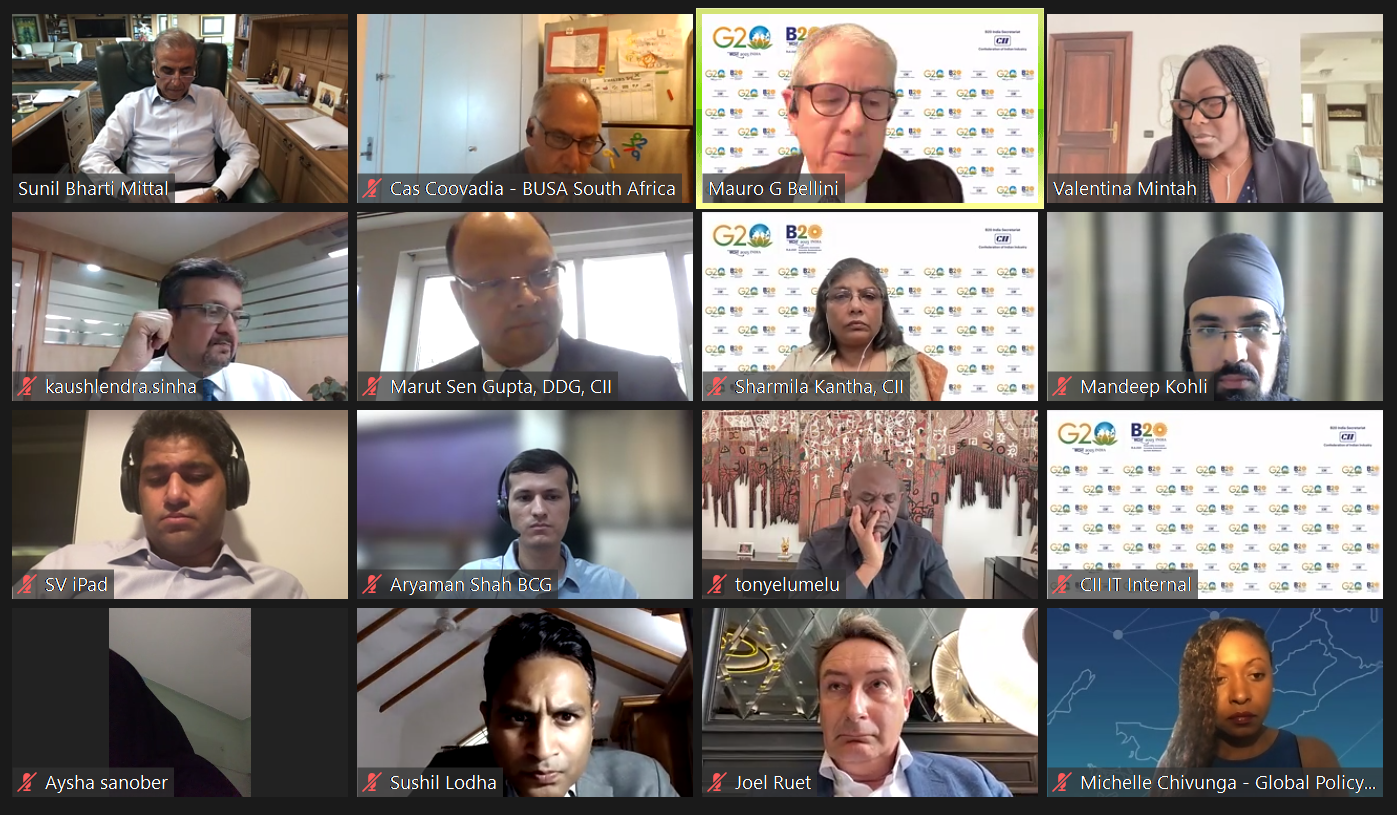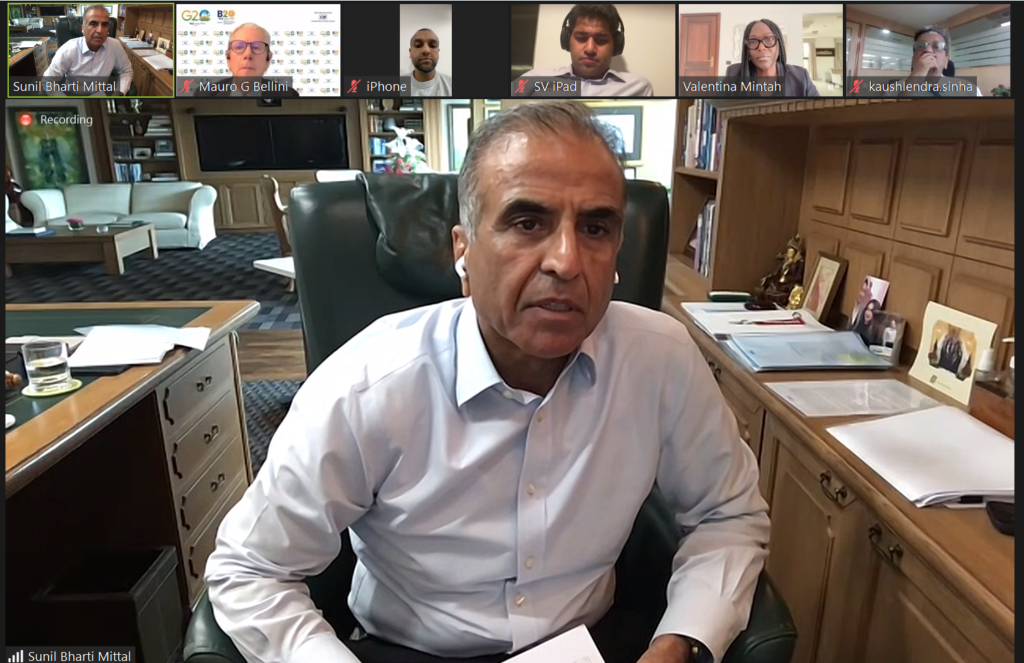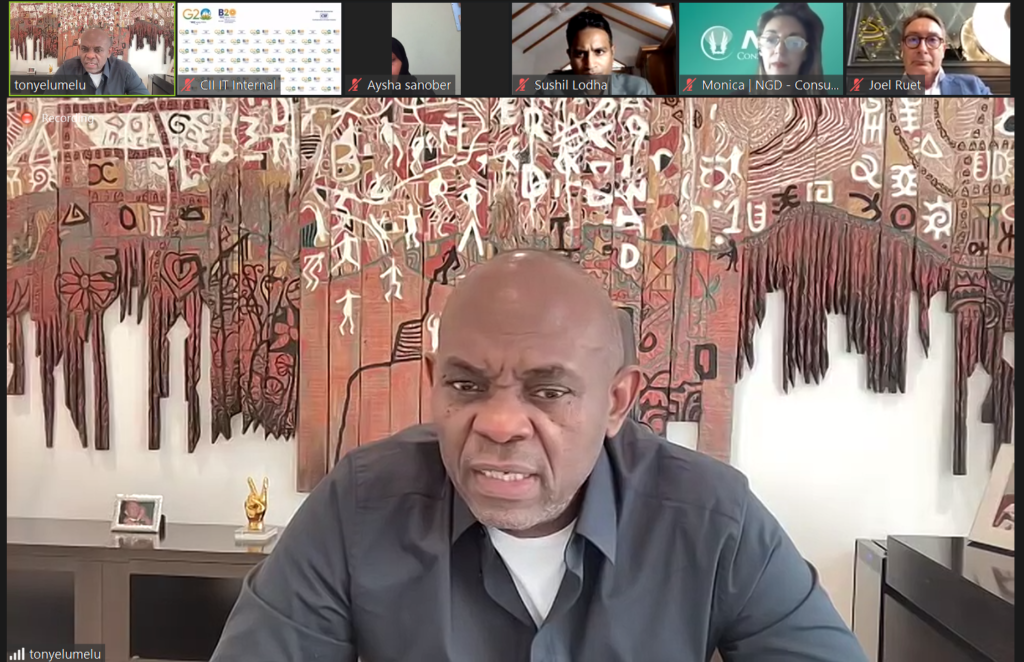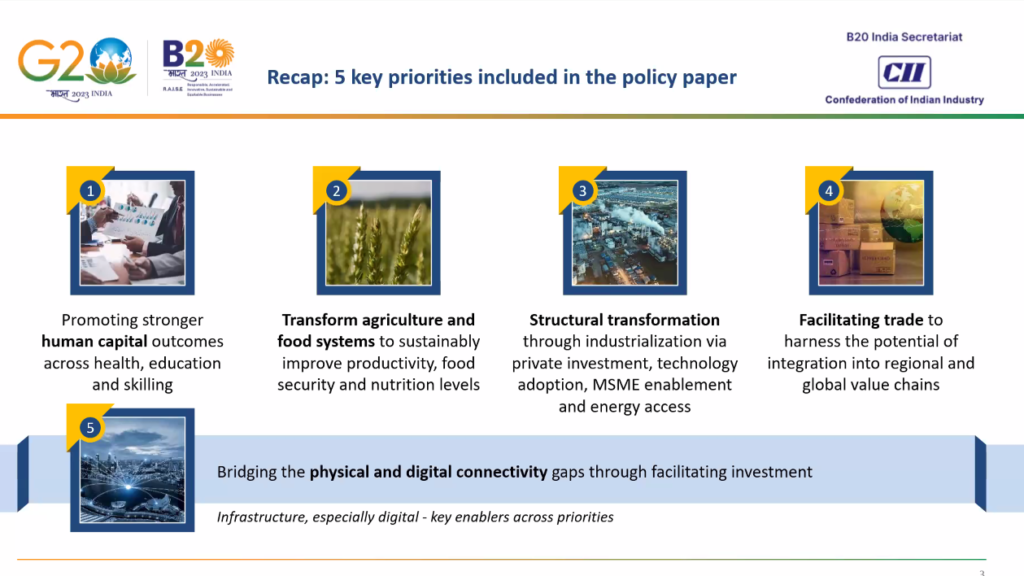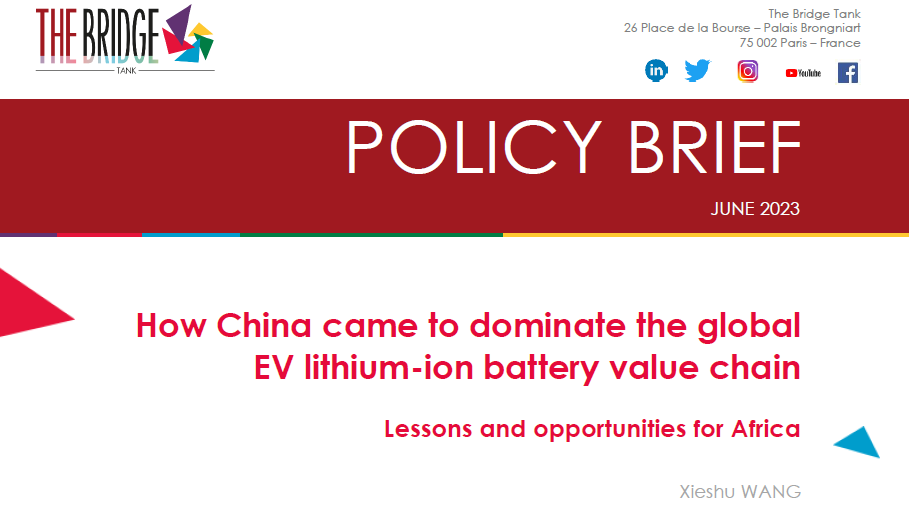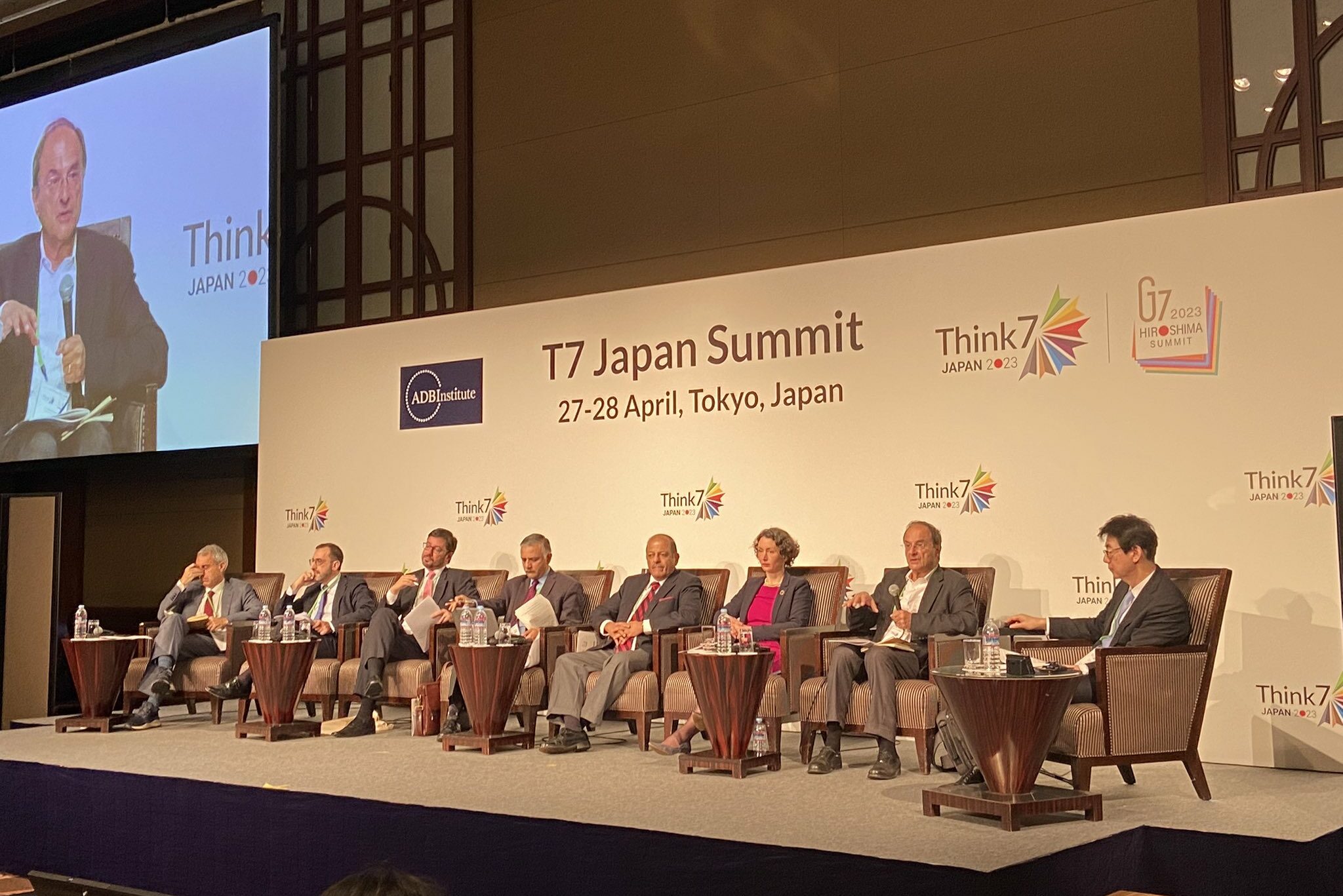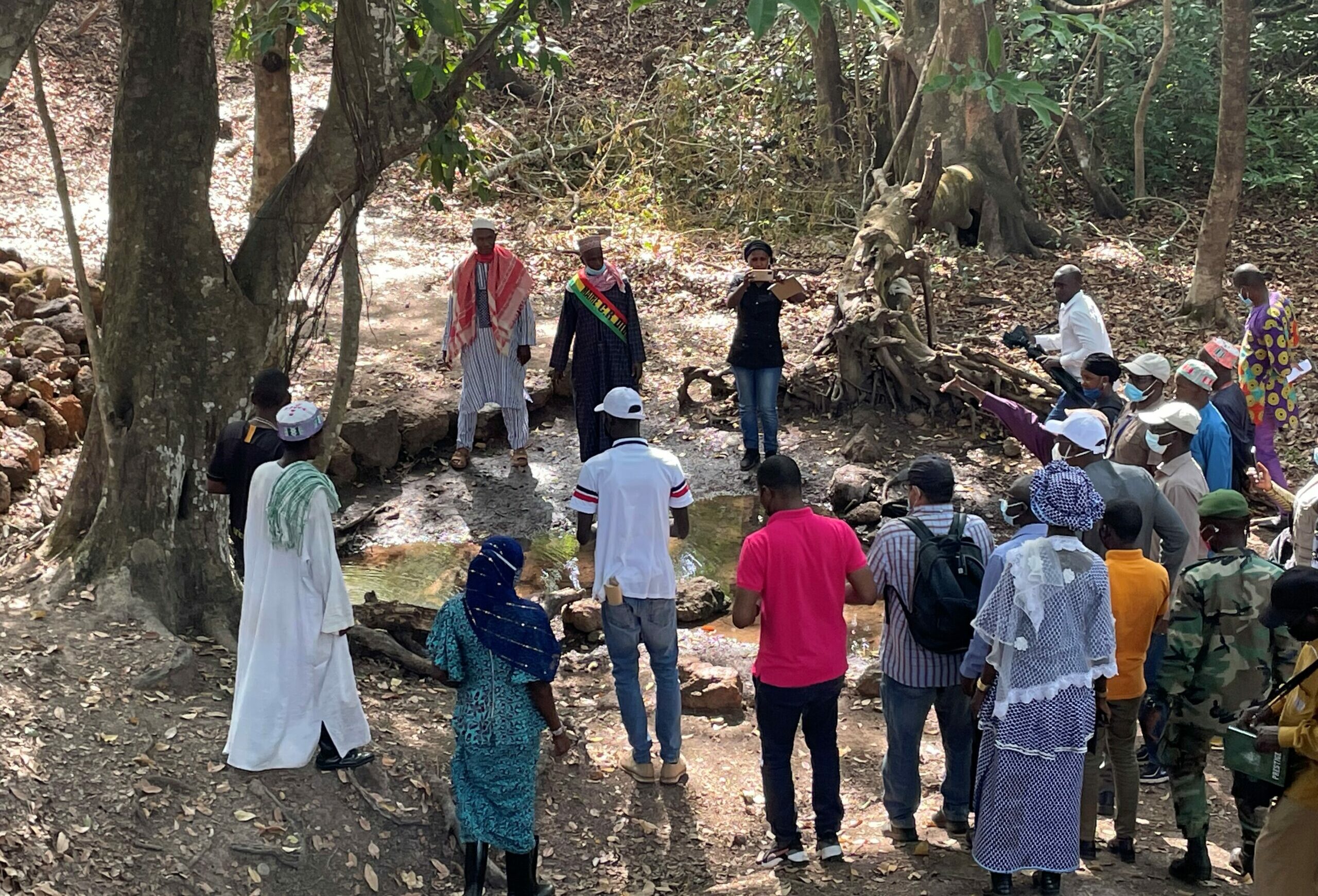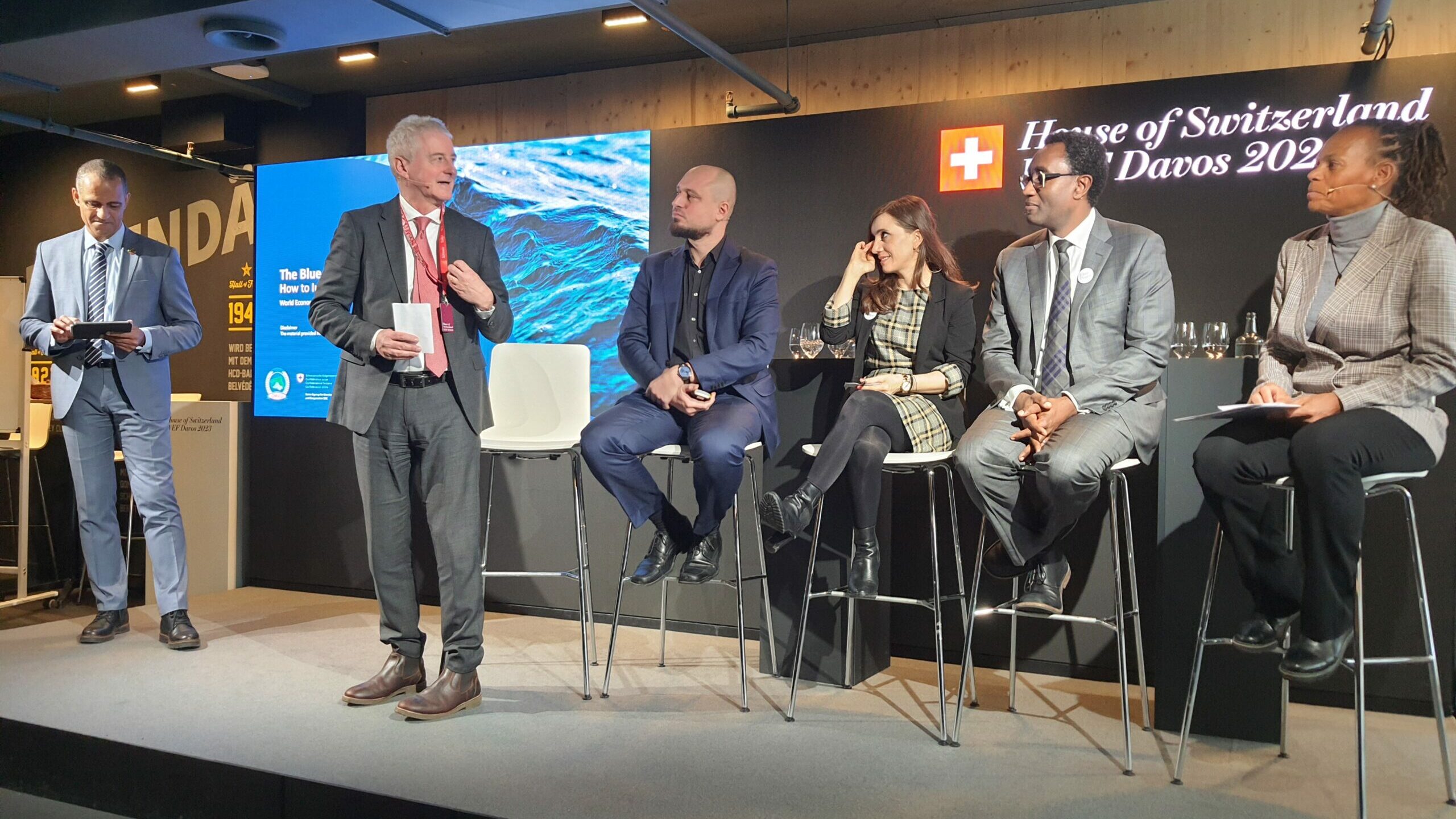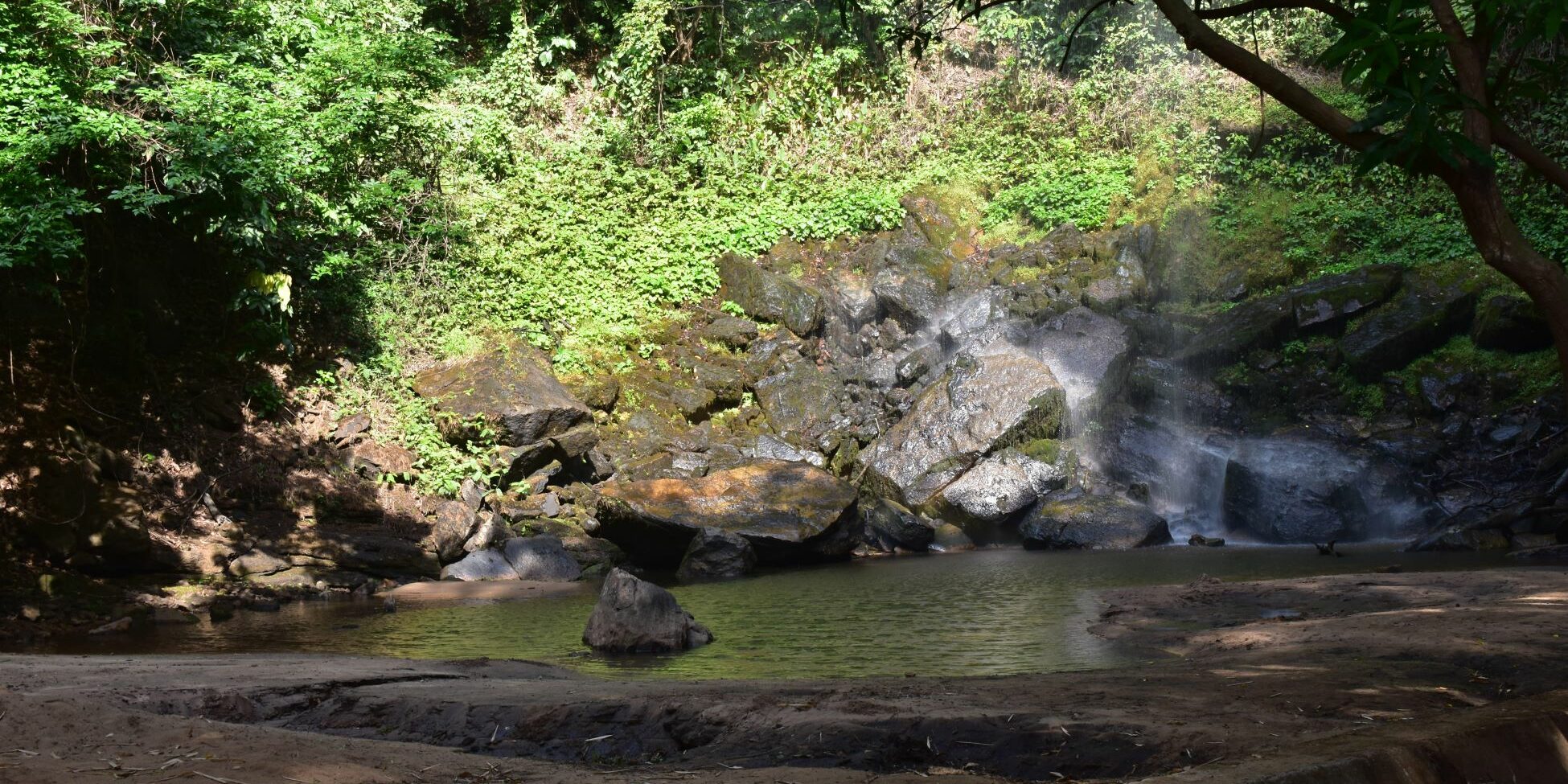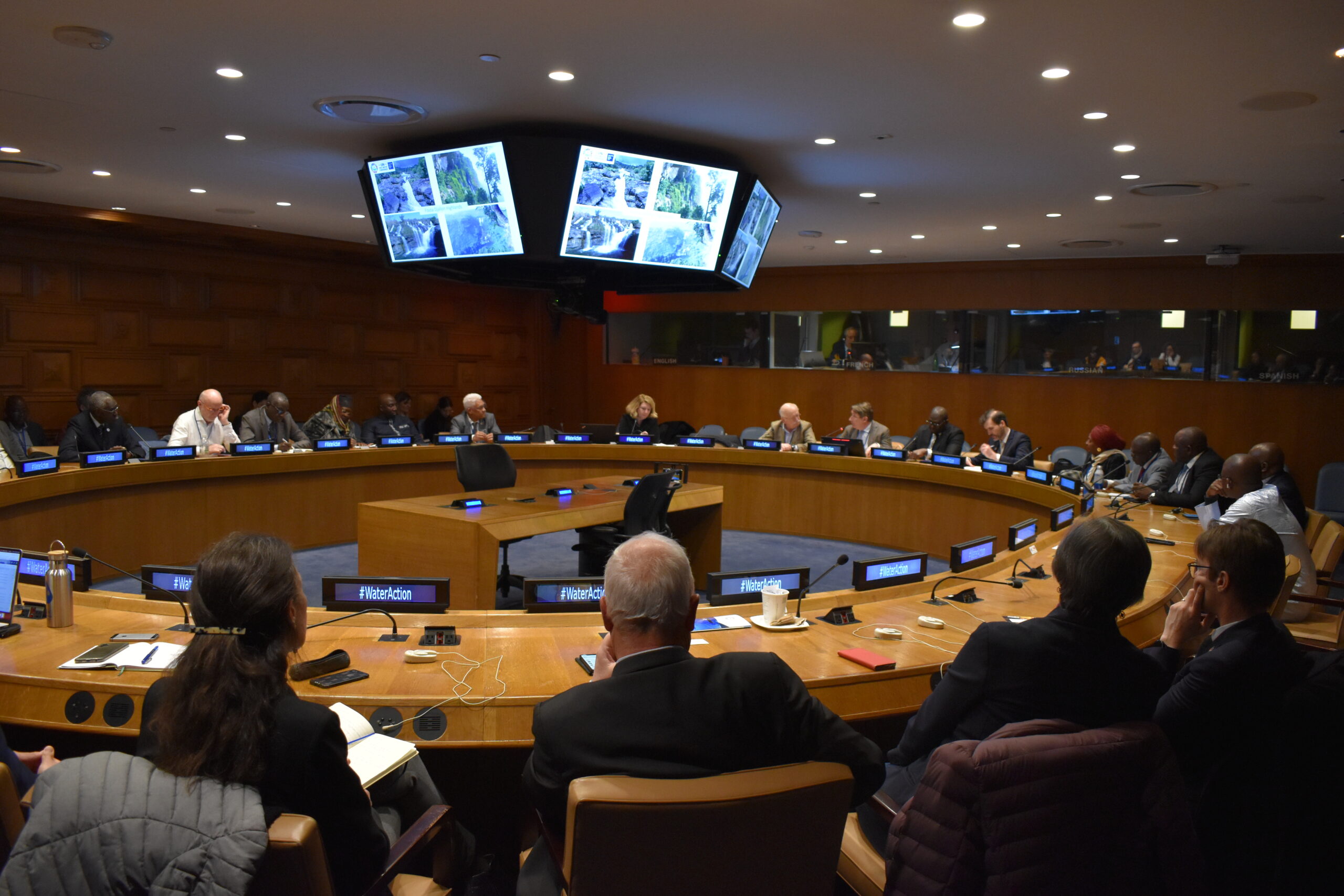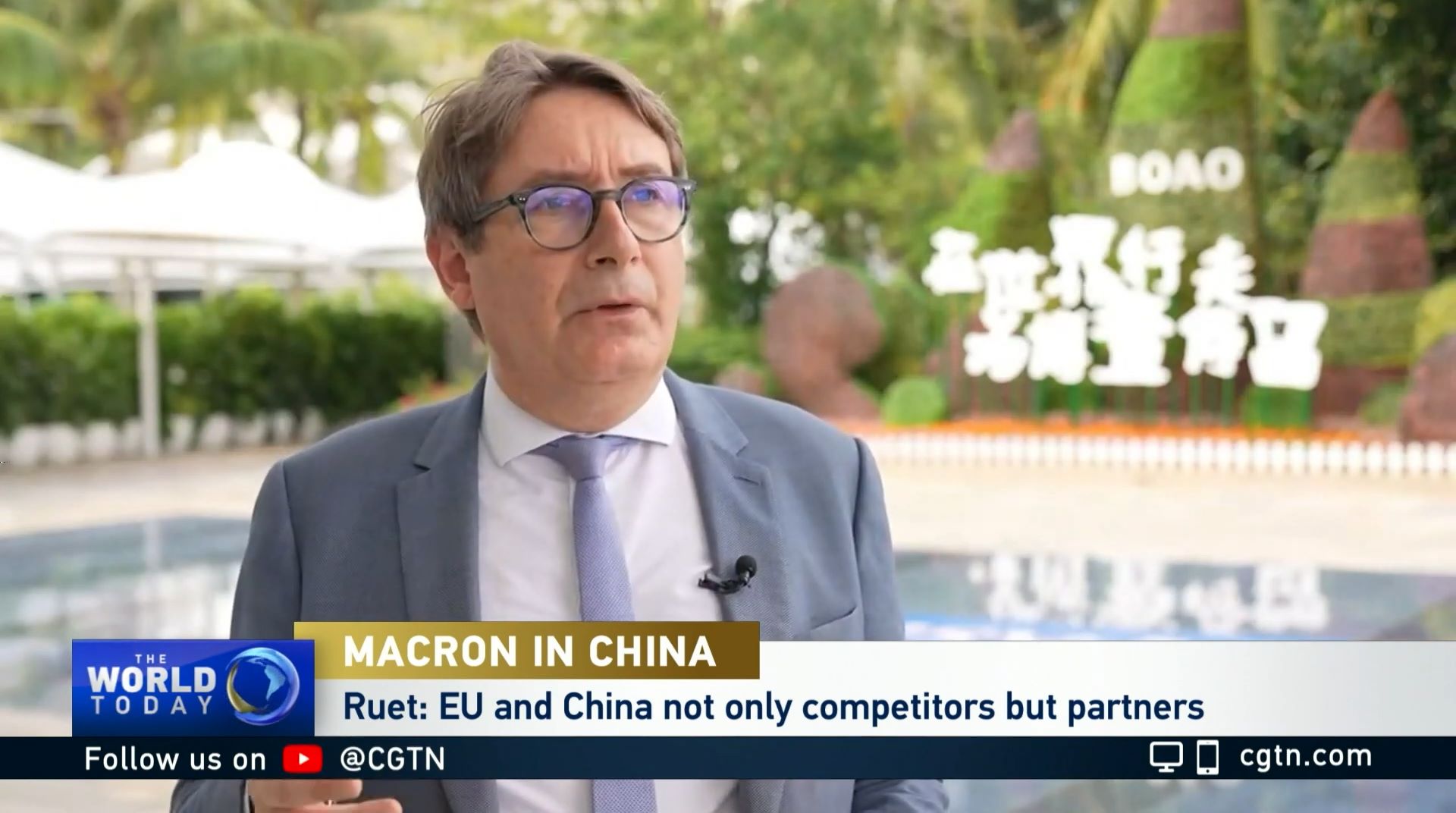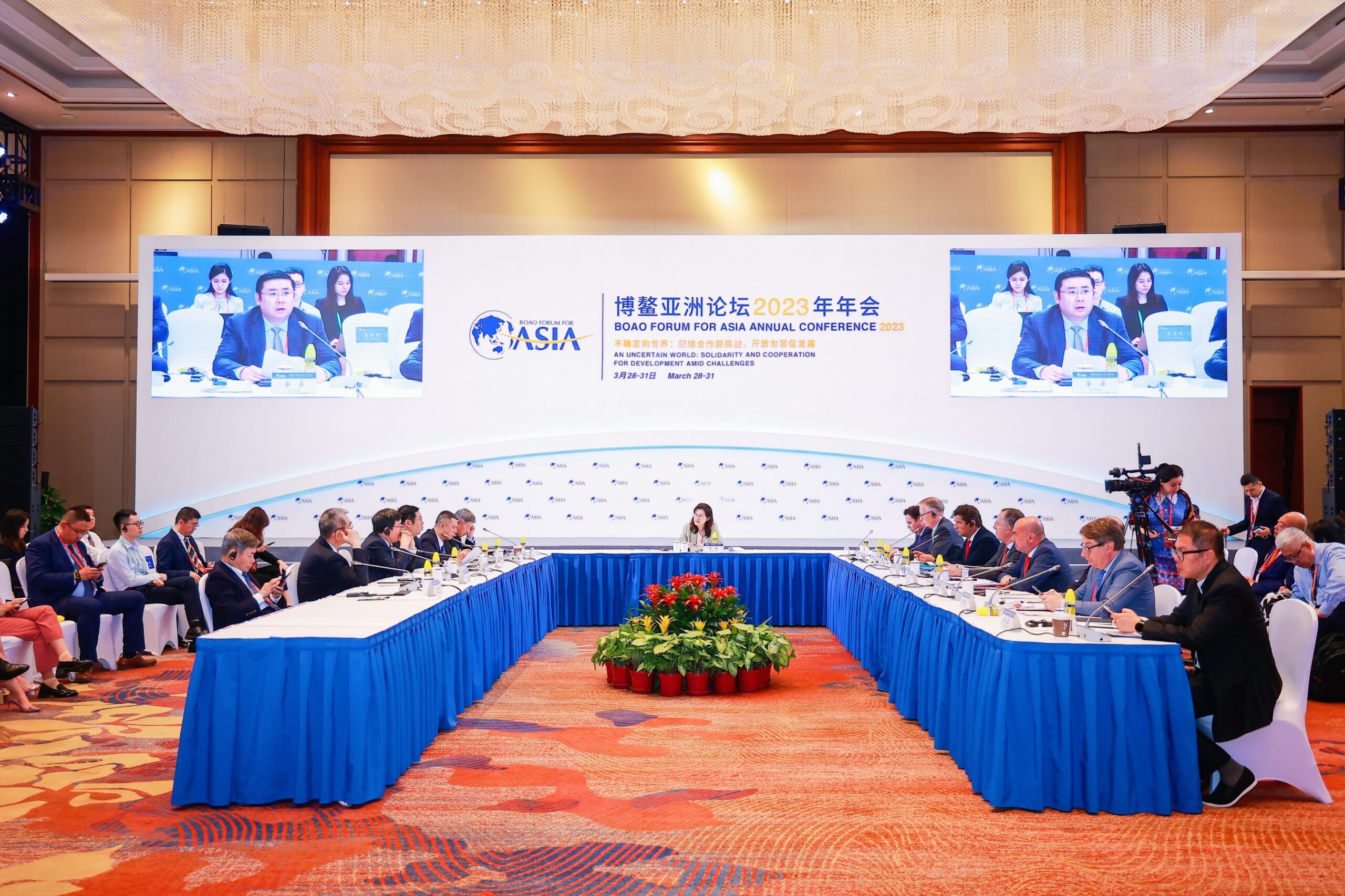Policy Brief – How China came to dominate the global EV lithium-ion battery value chain: Lessons and opportunities for Africa
This policy brief was written by Xieshu WANG, Senior Expert, Finance, Resources and Mobility, The Bridge Tank, and was first published by the Centre for Business and Development Studies, Copenhagen Business School Policy Brief No. December 2022. For the original publication, click here.
The electrification of vehicles is accelerating and the global automotive industry is under full transformation. China has become an indispensable partner for EV makers as the only country that has succeeded in building a complete and competitive industry value chain of EV lithium-ion batteries. Top-down government-led policymaking has been an important driver; bottom-up firm-level vertical integration strategy and investments have effectively created a closed-loop supply chain. Africa is still at an early stage in this mobility transition. But with its rich deposits of minerals and potential markets, it can become a key player in the global EV value chain, if a favourable ecosystem for the fast uptake of EV and related green businesses could be developed in time.
Key points:
- Government-led policymaking, constant adjustments, and temporary infant industry protection policies have been some of the main drivers of the fast-growing EV industry and the lithium-ion battery sector in China.
- Many Chinese firms deploy a strategy that can be defined as “specialised vertical integration”, i.e., actively entering related upstream and/or downstream segments within the EV lithium-ion battery supply chain, while continuing to reinforce their existing capacity in the original segment of the value chain, which serves as an expansion base.
- With the soaring demand for minerals for batteries and EVs, Africa, with its rich deposits of lithium, copper, cobalt and other minerals, could become a key player in the global EV value chain.
- Designing an EV promoting regulatory framework, applying incentive policies, & developing government-led R&D programs are important starting points to attract technologically leading MNEs in the EV value chain, encourage local startups and develop competitive industrial clusters. Fostering regional alliances and collaboration as well as developing industrial investment funds dedicated to firms along the EV value chain are other avenues of action that ought to be explored.
About the author
Xieshu WANG is Senior Expert, Finance, Resources and Mobility at The Bridge Tank and associated researcher at the Centre de recherche en Économie de l’Université Paris Nord (CEPN). She is a member of the Osservatorio sulle Economie Emergenti Torino (OEET) and has been a research fellow at the Interdisciplinary Institute for Innovation of Ecole Polytechnique de Paris and the Department of Economics and Statistics ‘Cognetti de Martiis’ of the University of Turin.
T7 Japan Summit – A call for greater collaboration with the Global South and between G7 & G20
With Japan presiding over the G7 in 2023, the organisation’s Think 7 (T7) engagement group with think tanks met in Tokyo from 27-28 April 2023 for its yearly summit, just three weeks before the G7 summit in Hiroshima from 19-21 May. Addressing Crises, Reigniting Sustainable Development, Bridging the G7 and G20 was the theme of this year’s T7 Japan.
A member of the T7 since 2022, The Bridge Tank had taken part in the T7 handover webinar in November 2022 during which Germany had handed over the T7 chairmanship to the Asian Development Bank Institute (ADBI). The meeting had marked the start of a year during which T7 focussed on “promoting multilateralism and G7 engagement with developing countries to help address global challenges” as well as promoting “inclusive and sustainable growth and development.”
For the past months, T7 Japan discussed and prepared policy recommendations within 4 task forces :
- Development and Economic Prosperity,
- Wellbeing, Environmental Sustainability, and Just Transition,
- Science and Digitalization for A Better Future,
- Peace, Security, and Global Governance.
T7 recommendations & priorities
The Tokyo Summit from 27-28 April 2023 brought forth the conclusions and recommendations raised by the different T7 task forces for the G7 throughout the first half of 2023. The April 2023 Think7 Japan Communiqué stressed the urgency of:
- Addressing intersecting crises: threats to global peace, the rampant international financial crisis and dept crisis, threats to climate and biodiversity and the need to strengthen environmental diplomacy;
- Reigniting Agenda 2030 and stressing the centrality of the SDGs as a guiding force for the future;
- Investing in Global Science Systems and Research Infrastructure
- Fostering greater collaboration between G7/G20.
This call for greater G7/G20 collaboration was also illustrated during the T7 Summit through a session gathering the Chairs of 2022 T7 Germany, 2023 T7 Japan, 2023 T20 India, 2024 T20 Brazil, and 2024 T7 Italy, as both engagement groups expressed their eagerness to deepen ties.
Greater engagement with the Global South
Ahead of the G7 Summit in Hiroshima, ADBI Dean and T7 Chair Tetsushi Sonobe re-empasised the need for the G7 and its partners to deepen their engagement with developing countries. Such collaboration between the G7 and the Global South would be critical to address intersecting crises and encourage sustainable development, Dean Sonobe added.
The T7’s call for greater engagement with the Global South found an echo at the G7 Summit in Hiroshima, as invitations to take part in the summit were extended to a large community of nations, particularly from the Global South. Invited countries included Brazil, which currently chairs the Amazon Cooperation Treaty Organization, India, which holds the 2023 G20 Presidency, Comoros, which chairs the African Union in 2023, Indonesia, currently chairing the ASEAN, as well as Vietnam, the Cook Islands, South Korea and Australia.
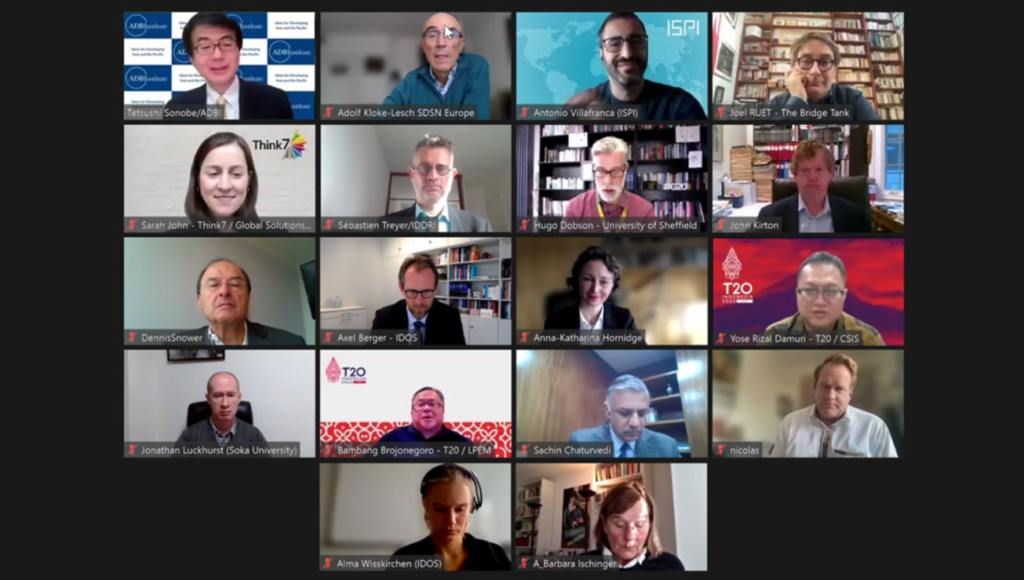
The Fouta Djallon Highlands: The Bridge Tank & OMVS on a field mission in Guinea
In 2021 and 2022, The Bridge Tank took part in two field missions in the Fouta Djallon, in northern Guinea. These forested highlands, commonly referred to as the water tower of West Africa, are home to the headsprings of some the region’s largest rivers, i.e. the Senegal River, the Niger River and the Gambia River. They offer a reservoir of biodiversity constituting the strategic depth of the Great Green Wall in the Sahel. These missions led by our board member Hamed Diane Semega, then High Commissioner of the Senegal River Basin Development Organisation (OMVS), with the participation of Joel Ruet, President of The Bridge Tank, allowed us to collect valuable testimonies about the challenges faced by local populations and the degradation of the Fouta Djallon’s ecosystems.
The field missions were instrumental in structuring our roadmap for the preservation of Fouta Djalon, which we presented alongside Initiatives for the Future of Great Rivers (IFGR) and OMVS during a side event at the UN 2023 Water Conference, and our policy brief on hydro-diplomacy.
These two field missions in the Fouta Djallon highlands documented the decline of the Senegal River’s headwaters and the dramatic drop in their water levels. Just a few decades ago, a man could drown in the deep pools of the springheads. Today, only small puddles remain in these very same locations. The Bridge Tank accompanied OMVS and its high commissioner Hamed Semega, founding board member of The Bridge Tank, on what was the first visit by an OMVS high commissioner to the Senegal River springheads.
In February 2022, Hamed Diane Semega, accompanied by Guinea’s Minister of Energy, Hydraulics and Hydrocarbons, Ibrahima Abe Sylla, the Director of the Guinean OMVS Unit, Soufiana Dabo, and the Director of SOGEOH (Société de Gestion de l’Énergie des Ouvrages du Haut Bassin du Fleuve Sénégal en Guinée), Souleymane Dravé, together inaugurated the premises of the future Environmental Documentation and Archiving Centre in Labé, Guinea. The center will play a key role in efforts to preserve the Fouta Djallon.
Protecting and restoring ecosystems

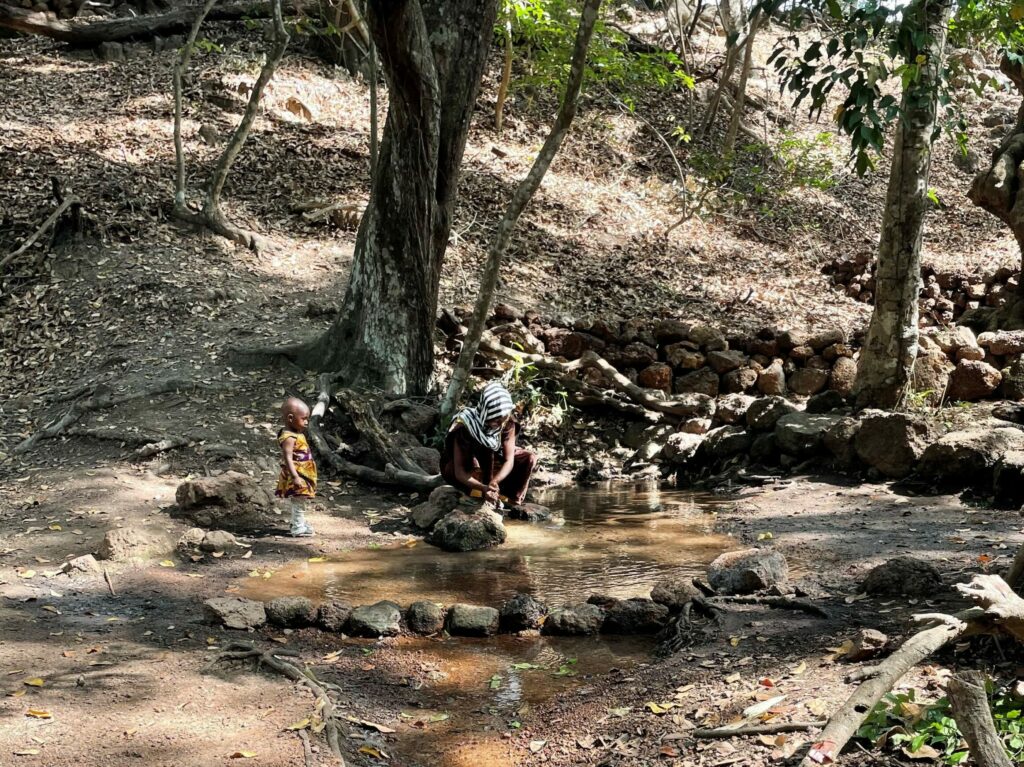
Local populations: the first victims of the springs’ disappearance
These missions revealed the many challenges faced by the people of the Fouta Djallon. Often stigmatized and accused of drawing excessively on the waters of spring heads and contributing to deforestation, local communities are in fact the first victims of the death of the springs.
In this sparsely populated area, access to water is a daily struggle. The mission found that villages are often far from the springs and the forests that shelter them. Populations suffer from a cruel lack of water. Moreover, the water is very often highly turbid and has a high concentration of earth, making it unfit for consumption.
Between the two missions, OMVS equipped some of these villages with wells to tap into groundwater resources, notably in Soulamayo, the village closest to the Senegal River’s dried-up geographical source.


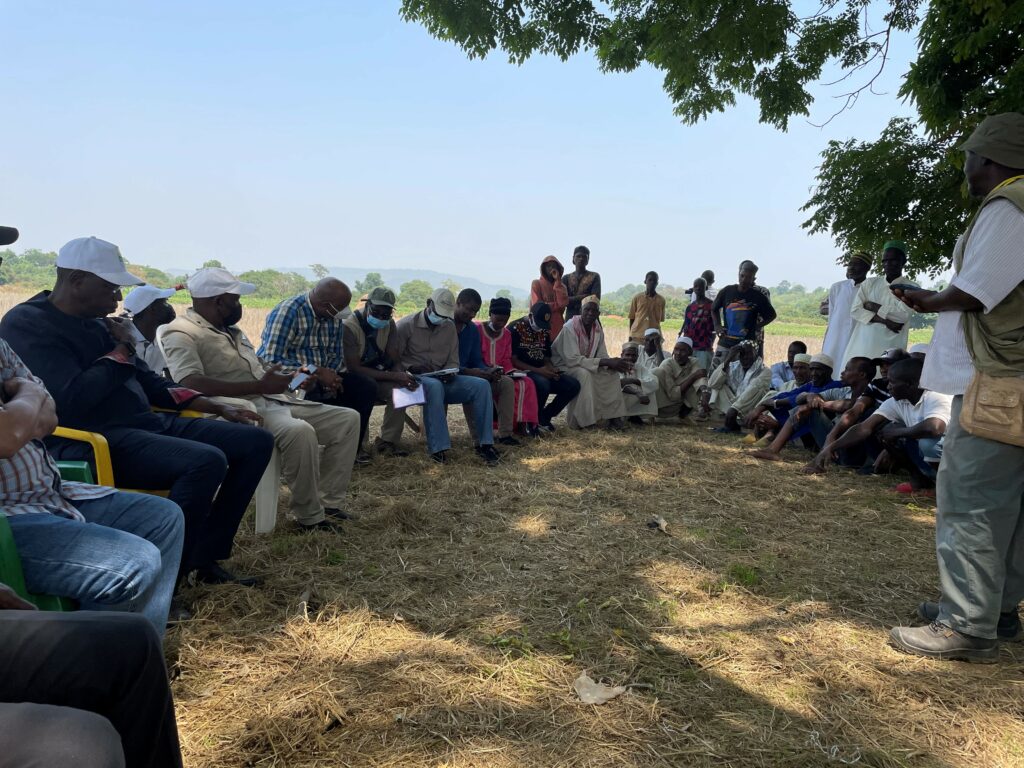
Agriculture and hydropower: A long-term development vision
The region and its populations require a long-term vision and solutions to enable a more sustainable development that takes into account both their needs and the issues of preserving and restoring forest and water ecosystems. Such development will notably involve the (re-)adoption of agricultural methods adapted to changing demographic and environmental conditions, and the advancement of electrification.
In Koukoutamba, local residents expressed their support for the next major OMVS hydroelectric dam project currently being developed in the municipality. The Koukoutamba hydroelectric dam, located on the Bafing River in the upper Senegal River basin, will have a capacity of 294 MW and will be the largest dam built by OMVS. Financed by the Chinese Exim Bank for a total of over $800 million, and developed by the Chinese company Sinohydro, the project will contribute to the economic development and electrification of rural areas in the region.


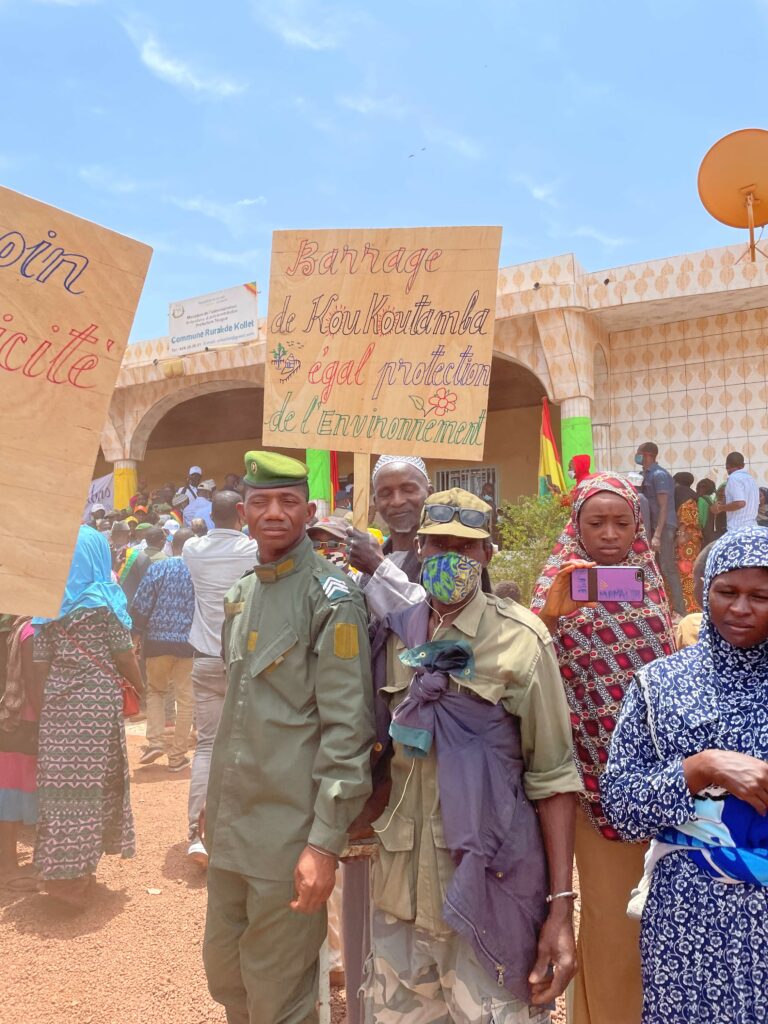

A lasting commitment
The Bridge Tank’s commitment in favour of the preservation of the Fouta Djallon highlands has grown steadily ever since. In 2021, this commitment was reflected in the organisation of special session at the World Water Forum in Dakar, Senegal, titled “The Fouta Djallon Highlands : visions and actions to safeguard the water tower of West Africa” in partnership with OMVS, OMVG and Initiatives for the Future of Great Rivers (IFGR). At the UN 2023 Water Confernece in New York in March 2023, The Bridge Tank and IGFR intensified their cooperation in favour of the preservation of the Fouta Djallon by raising the alarm through the publication of an Op-ed co-signed by Erik Orsenna, Chairman of IGFR, Joel Ruet et Hamed Diane Semega, and through the organisation of an official side event of the UN 2023 Water Conference in partnership with OMVS and with the official support of France and Guinea.


From Davos to New York: The Bridge Tank explores new blue finance initiatives
The Bridge Tank’s presence in Davos, Switzerland during the World Economic Forum 2023 and its participation to the UN 2023 Water Conference in New York set two new milestones in The Bridge Tank’s research on innovative financial tools in support of hydro-diplomacy, in the weeks following the launch of the World Water for Peace Conference.
On Thursday, January 19th, 2023, the promotion of transboundary water cooperation found a home at the House of Switzerland in Davos. Represented by its chairman, Joel Ruet, and board member Raphael Schoentgen, The Bridge Tank attended an event on “Innovative Impact Investing through Blue Peace Bond” co-organised by the United Nations Capital Development Fund (UNCDF) and the Swiss Agency for Development and Cooperation (SDC). Two months later, on March 23rd, during the UN 2023 Water Conference, The Bridge Tank took part in a second session on this very topic at the UN Headquarters in New York, through the presence of Joel Ruet and Cédric Terrasson, Editor & Junior Analyst.
These two sessions presented the vision and the potential of the Blue Peace Financing Initiative, a promising new blue finance programme which aims to use water and transboundary rivers as an entry point for peace-building and socio-economic development. The programme will help develop and provide financial support to multi-sectoral cooperation frameworks pursuing sustainable and integrated co-management of transboundary rivers and water resources. Blue Peace will help scale up those frameworks and their associated investment plans by issuing Blue Peace Bonds, which will facilitate access to public and private capital.
This is of particular interest for River Basin Organisations (RBOs) all around the world, as the pilot projet for which the first Blue Peace Bond will be issued in 2023 has been developed in support of a West-African RBO, i.e. the Gambia River Basin Development Organization (Organisation pour la mise en valeur du fleuve Gambie, OMVG).
Investing in Water for Peace and Development
In keeping with the UN Sustainable Development Goals, the Blue Peace Financing Initiative aims to provide affordable, inclusive, and safe access to water-related services in order to ensure food security, access to clean drinkable water, and affordable green energy.
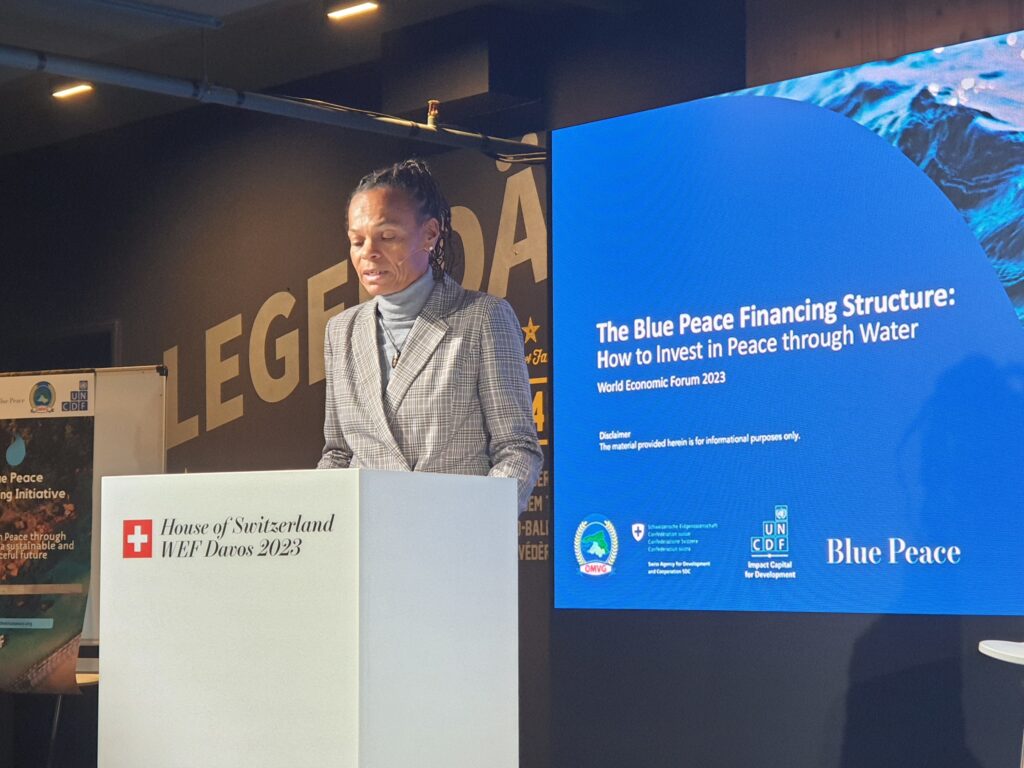
The programme approaches water as a vector for peace, cooperation, and socio-economic development by fostering a more equitable, sustainable, and peaceful integrated management of transboundary water resources.
The Davos session was opened by Patricia Danzi, Ambassador, Director General, SDC, and moderated by Christian Frutiger, Ambassador, Assistant Director General, SDC, who gave the floor to the following panellists to discuss the vision and structure of Blue Peace:
- Jaffer Machano, Global Program Manager, UNCDF
- Rukan Manaz, Program Specialist, Blue Peace Financing, UNCDF
- Hans-Ruedi Mosberger, Head of Asset Management and Sustainability, Swiss Bankers Association SBA
- Matus Samel, Research Manager, Economist Impact
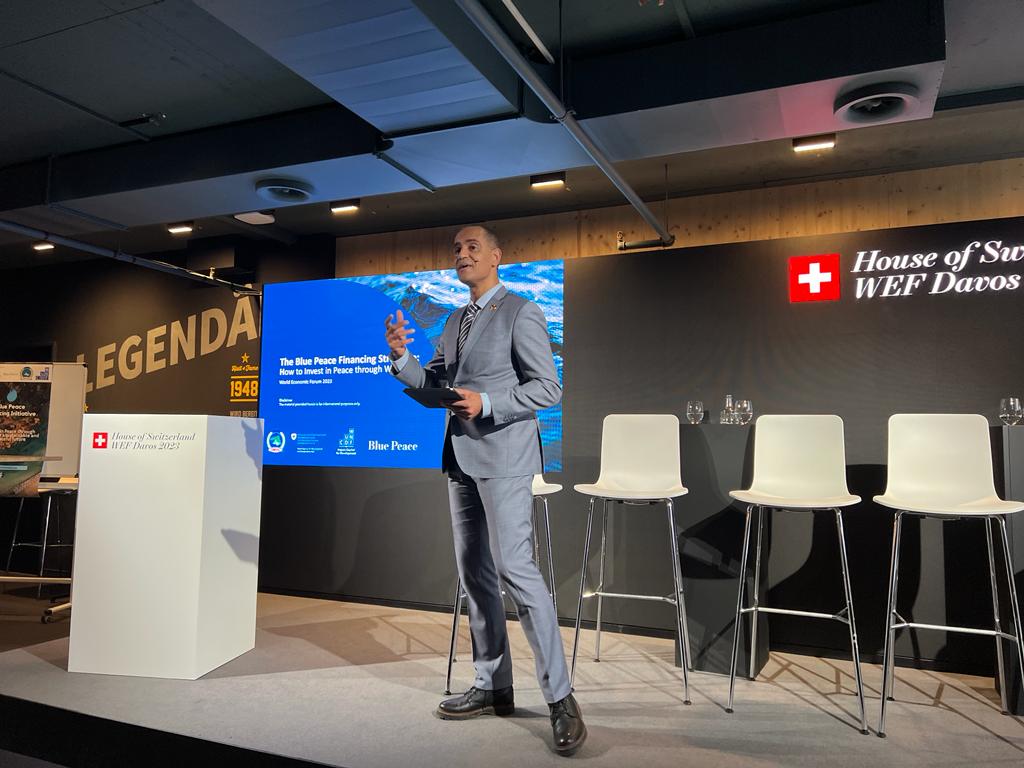
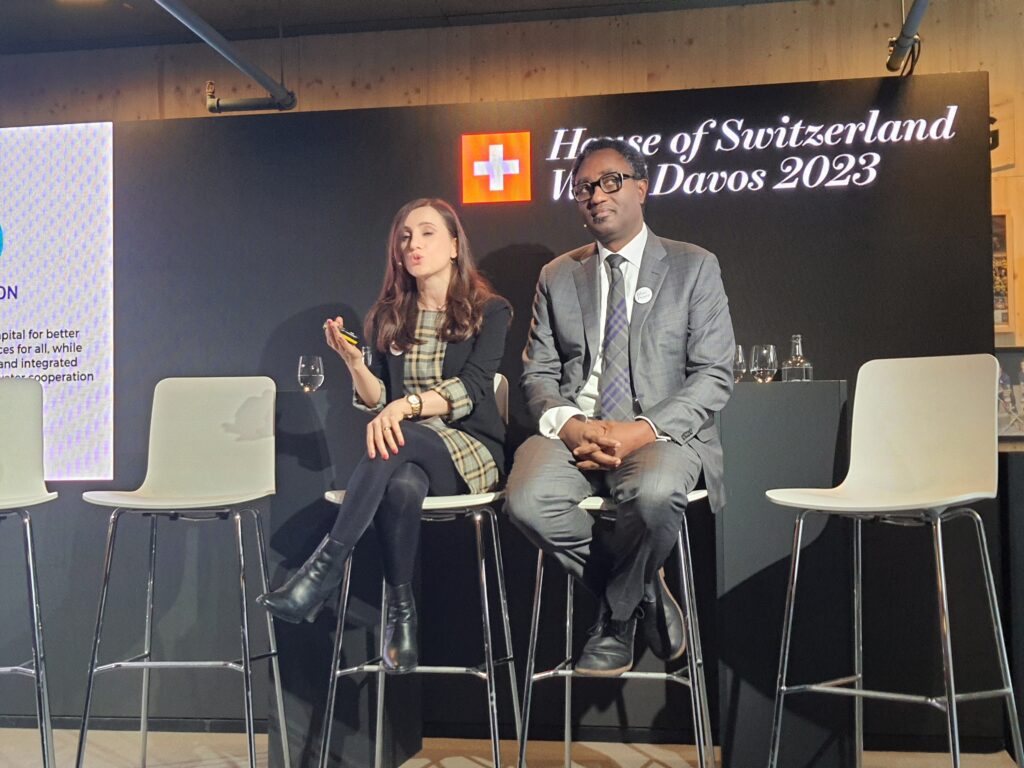
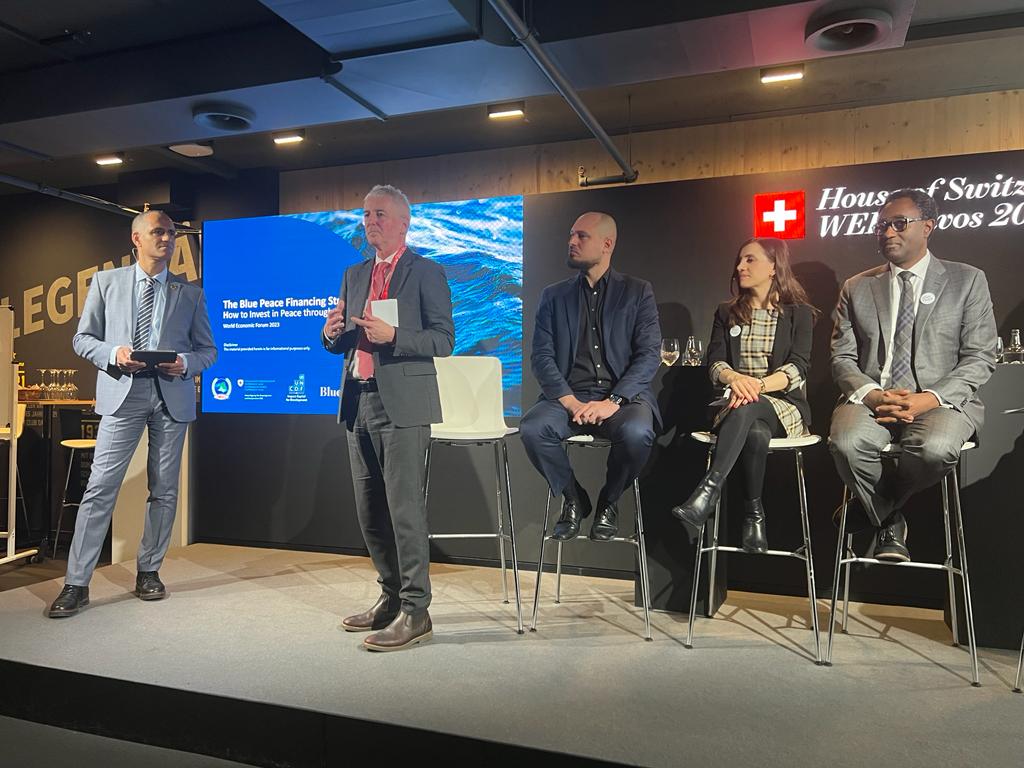
At the UN 2023 Water Conference, the session was opened by Mourad Wahba, Officer in Charge, United Nations Capital Development Fund (UNCDF) and saw contributions from:
- Daouda Samba Sow, Secretary General, OMVG
- Rohey John Manjang, Minister of Environment, Climate Change and Natural Resources, The Gambia
- Usha Rao-Monari, Under-Secretary-General and Associate Administrator of UNDP
- Benjamin Powell, Head of Sustainable Debt Capital Market, Skandinaviska Enskilda Banken (SEB),
- Tania Rödiger-Vorwerk, Deputy Director General, Federal Ministry for Economic Cooperation and Development (BMZ), Germany
- Marjeta Jager, Deputy Director General, DG INTPA, European Commission
- Douglas R. Eger, Chairman & CEO, Intrinsic Exchange Group
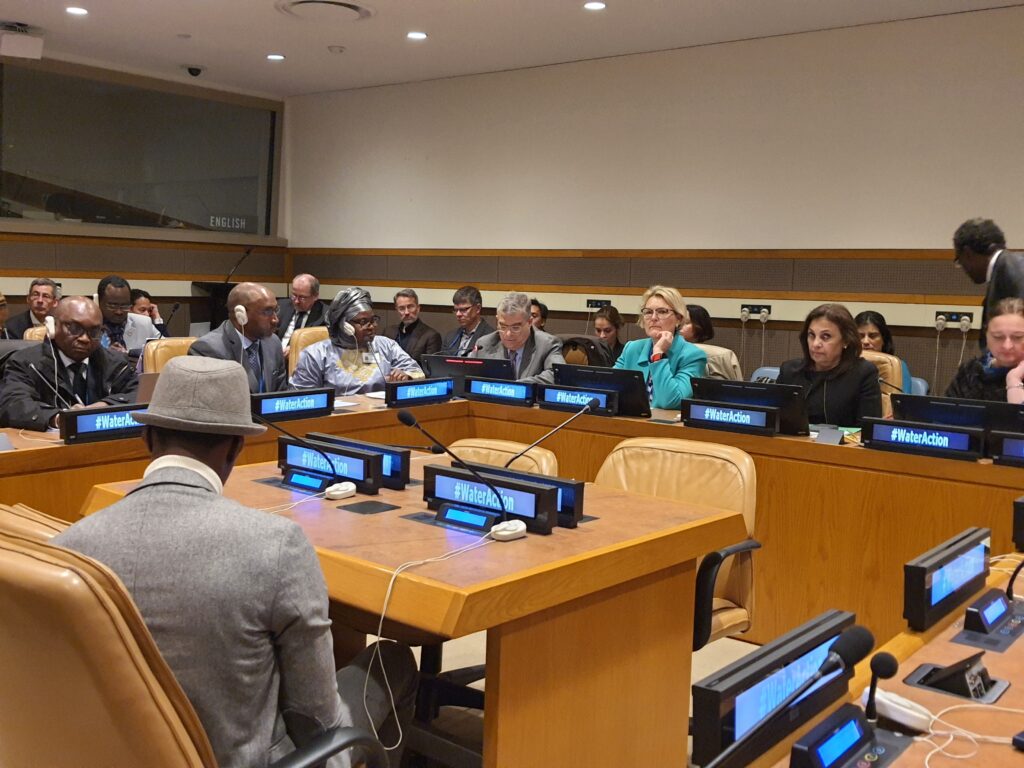
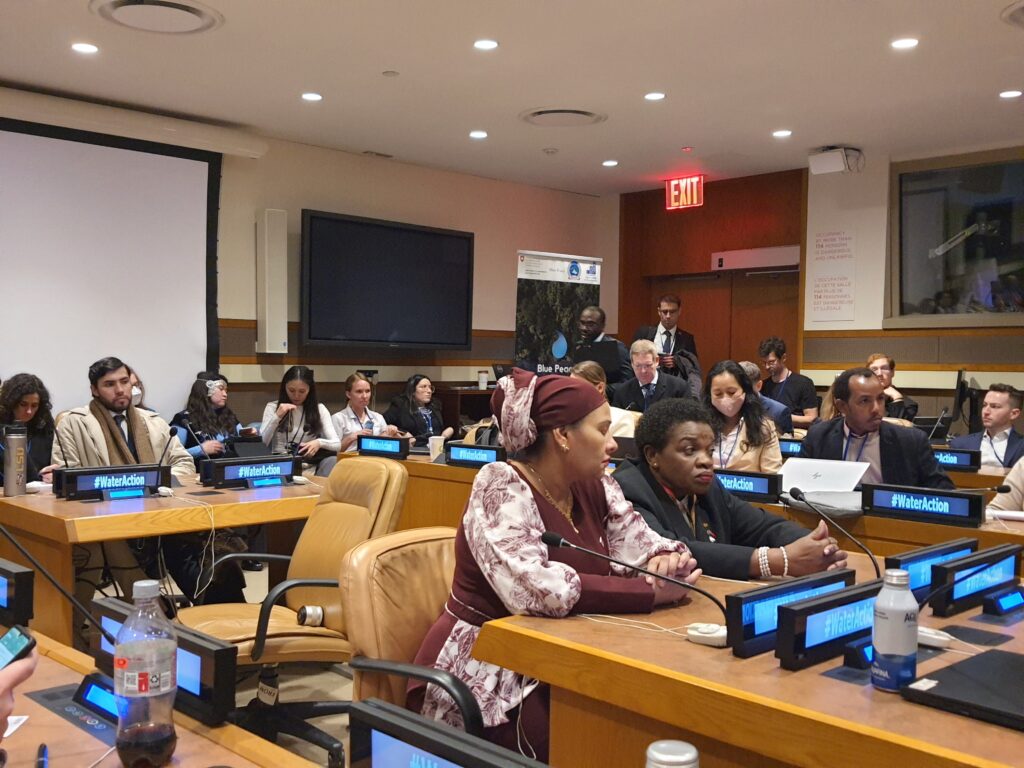
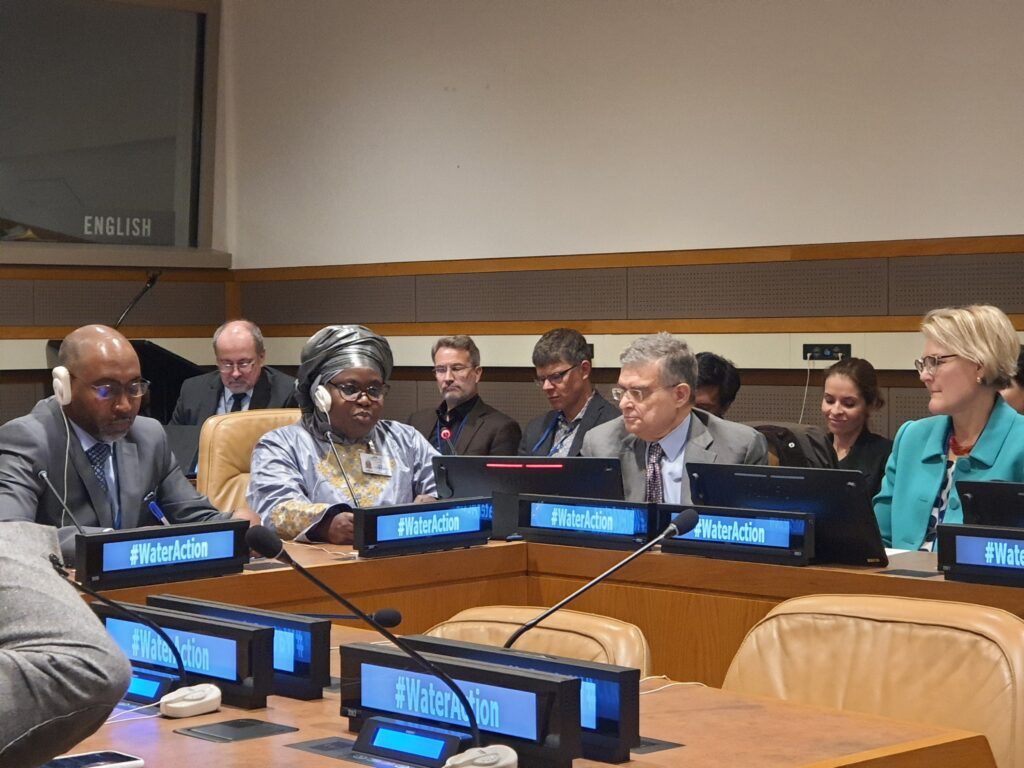
Supporting RBOs to foster change
Representing the UNCDF, Jaffer Machano and Rukan Manaz introduced the approach and structure of the Blue Peace Financing Initiative to the Davos audience. With pressure on water resources having become one of the great challenges of our times, water has become a source of tension and conflict in many regions around the world. Trying to break this downward spiral, the ambition of Blue Peace is to turn this contentious issue into an entry point for cooperation and sustainable development.
Blue Peace’s goal and overall mission is to generate and support water cooperation initiatives and develop a common understanding of transboundary water resources management by encouraging data-driven decision making. To reach this objective, Blue Peace comes in support of local & regional non-sovereign entities in charge of water management, e.g. River Basin Organisations.
Blue Peace’s support is structured around two essential activities:
- Capacity building and technical development;
- Facilitating access to public and private capital through an innovative financial tool, i.e. Blue Peace Bonds.
This is best exemplified through the Blue Peace Financing Initiative’s pilot project.
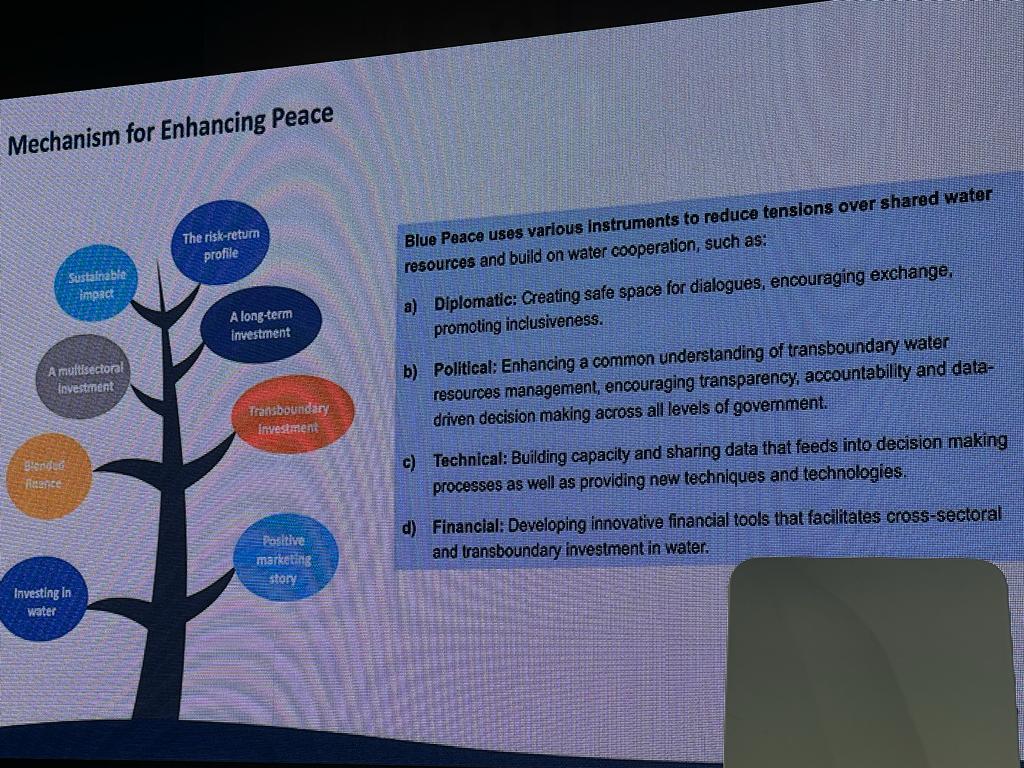
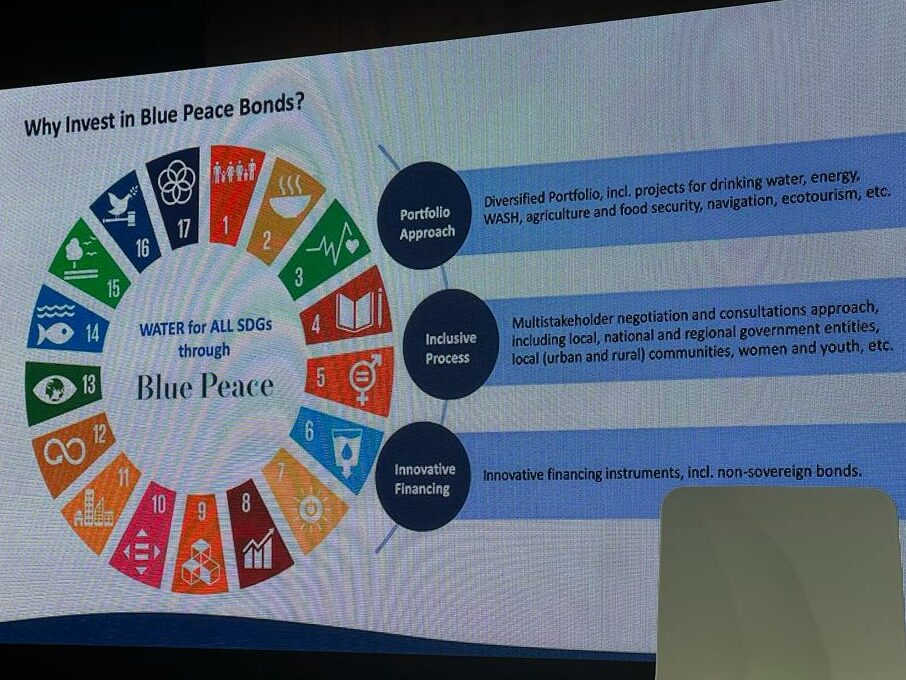
A Pilot Case in West Africa: the Gambia River Basin Development Organization
1. Capacity building and technical assistance
The Gambia River Basin Development Organization (OMVG) is an RBO which handles the co-management and development of the Gambia River Basin. It comprises four member states, from the springheads to the delta of the Gambia River: Guinea, Guinea-Bissau, Senegal, and Gambia.
In December 2019, the OMVG and the UNCDF signed a Collaborative Partnership into existence between the two organisations. The OMVG Council of Ministers subsequently issued a resolution (Nr.13/CM/45/B/G) green-lighting the development of the “OMVG Masterplan for the Integrated Development of its river basins, which will serve as the basis for the OMVG joint investment plan.” Such a Masterplan covers projects as diverse as the development of hydro-power, access to drinking water, natural parks, irrigation of farmlands, or transport and navigation systems.
This encapsulates the first stage of Blue Peace. The technical assistance and institutional capacity building supports the development of this multisectoral masterplan, offering a long term development perspective carried out by the joint investment plan.
2. Facilitating access to capital
In the second stage of the Blue Peace Financing Initiative, the partnership between the OMVG and UNCDF helps equip “the OMVG with the adequate tools to develop innovative financing mechanisms that will enable it to directly access the financial markets through the issuance of bonds.”
In order to scale up and meet the objectives of the masterplan and joint investment programme, the regional sub-sovereign entity (in this case the OMVG, a multi state organisation) will issue a Blue Peace Bond in order to mobilise capital. This is done through a Special-purpose entity (SPV) created and owned by the River Basin Organisation, which is in charge of managing and implementing the Investment Plan.
Building on the Masterplan for integrated development, the portfolio approach of the Blue Peace Bonds allows to combine large infrastructure projects that are generating revenue with smaller but equally important projects which have a higher dependence on subsidies. This diversification and cross-subsidization offered by Blue Peace Bonds helps derisk investments while also funneling funds to smaller projects.
Blue Peace Financing Partners support the Blue Peace Bond by mobilizing banks and investors, while also contributing to the de-risking of the Bond. The SPV is in charge of repaying interest and principal through the cashflow of underlying projects. In 2023, the first phase of capital mobilization will cover between 500 and 750 million USD, with 2 billion USD in perspective over the coming years.
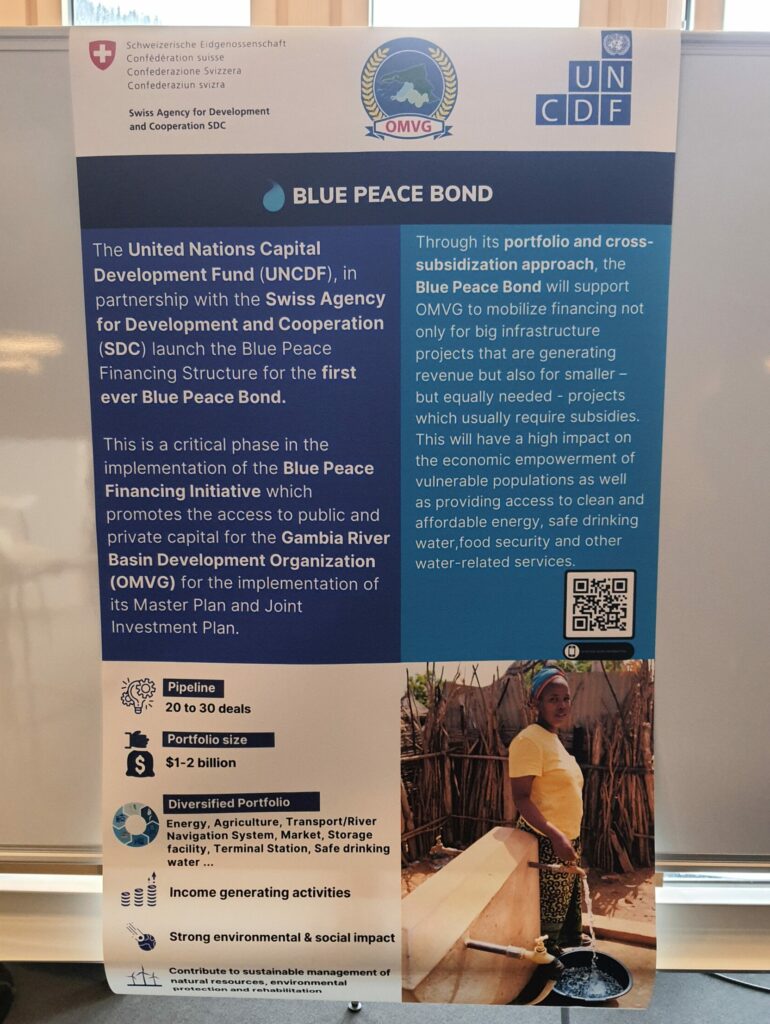
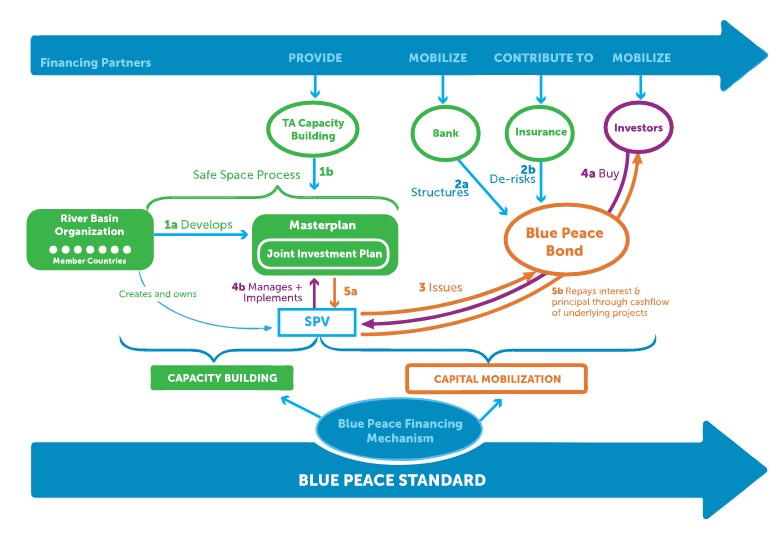
Facilitating future Blue Peace projects
A tool which will play an important role in supporting the Blue Peace Financing Initiative is the Blue Peace Index. Matus Samel, Research Manager, Economist Impact, introduced the index to the participants as a tool measuring the extent to which countries and basins manage their shared water resources in a sustainable, equitable and collaborative way.
The index analyses 74 qualitative and quantitative indicators across five domains:
- Policy & legal frameworks – development of legislative and regulatory frameworks at national and basin level
- Institutions & participation – institutional arrangements for cross-sectoral coordination, capacity building and information sharing
- Water management instruments – implementation of water management mechanisms
- Infrastructure & financing – implementation of sustainable investment in water management
- Cooperation context – exposure to major drivers and risk factors to peace
The Index provides an overview of the enabling environment for financing and investment in transboundary water management. The Blue Peace Financing Initiative Readiness Assessment will promote suitable investments by helping identify appropriate actors to support.
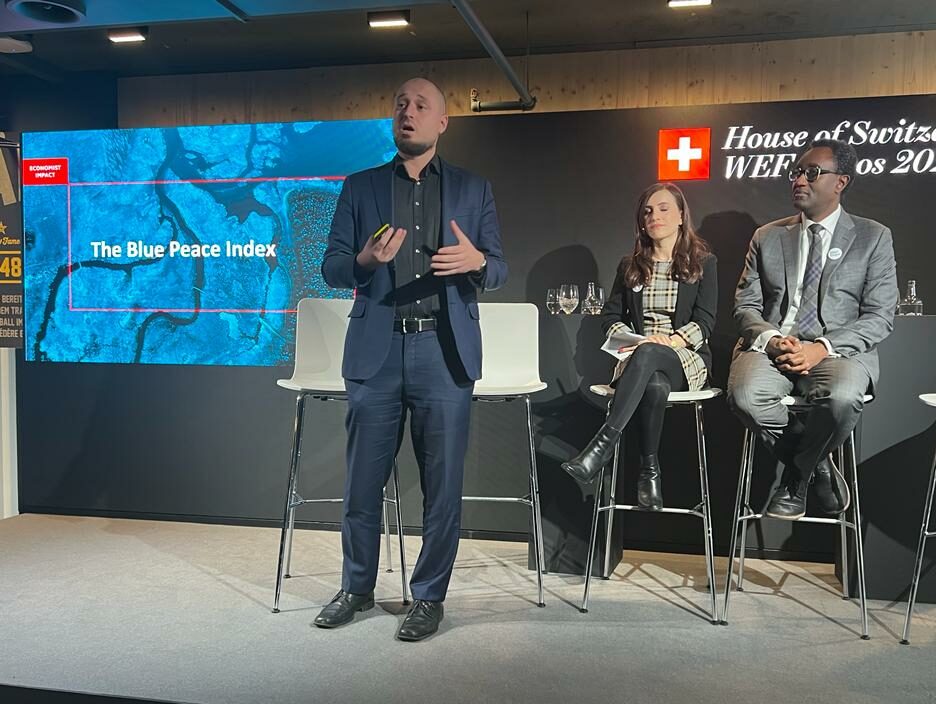
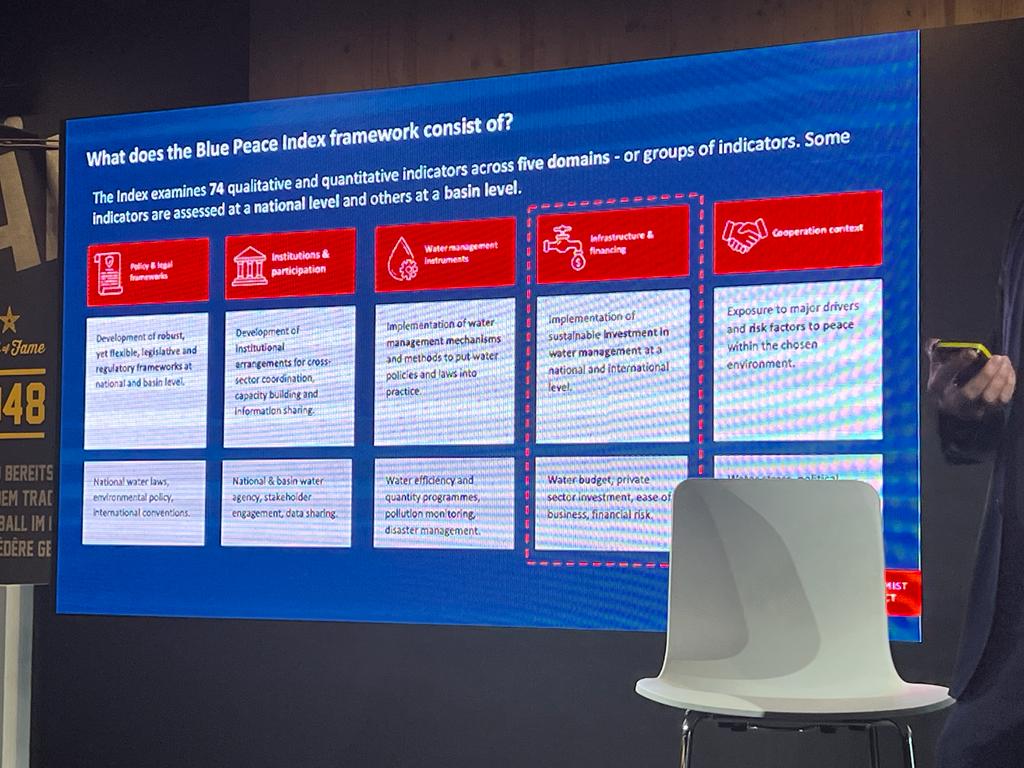
Attracting Investors for Blue Peace
As noted by Hans-Ruedi Mosberger, Head of Asset Management and Sustainability, Swiss Bankers Association, the Blue Peace Bond has the benefit of having been designed with the investor’s perspective in mind.
Mr Mosberger stated that investors do not like one-off investments; they favour scalable and replicable projects, which create a track-record reducing the risk of the investment. The diversification offered by the portfolio and cross-subsidization approach of Blue Peace, building on the Masterplan for integrated development, contributes to this improved risk-return.
The Blue Peace Financing Structure is a promising mechanism involving blended finance, i.e. using public funds to generate momentum and subsequently raise private capital, and non-sovereign bonds to create impact through water and transboundary rivers.
As however pointed out by the interventions of Mr Ruet and Mr Schoentgen during the Q&A session in Davos, this South-North cooperation must not only involve the Global North’s financial institutions but needs to incorporate the Global South’s financial institutions and service providers to serve as an opportunity for the Global South to develop and leverage its own financial ecosystem.
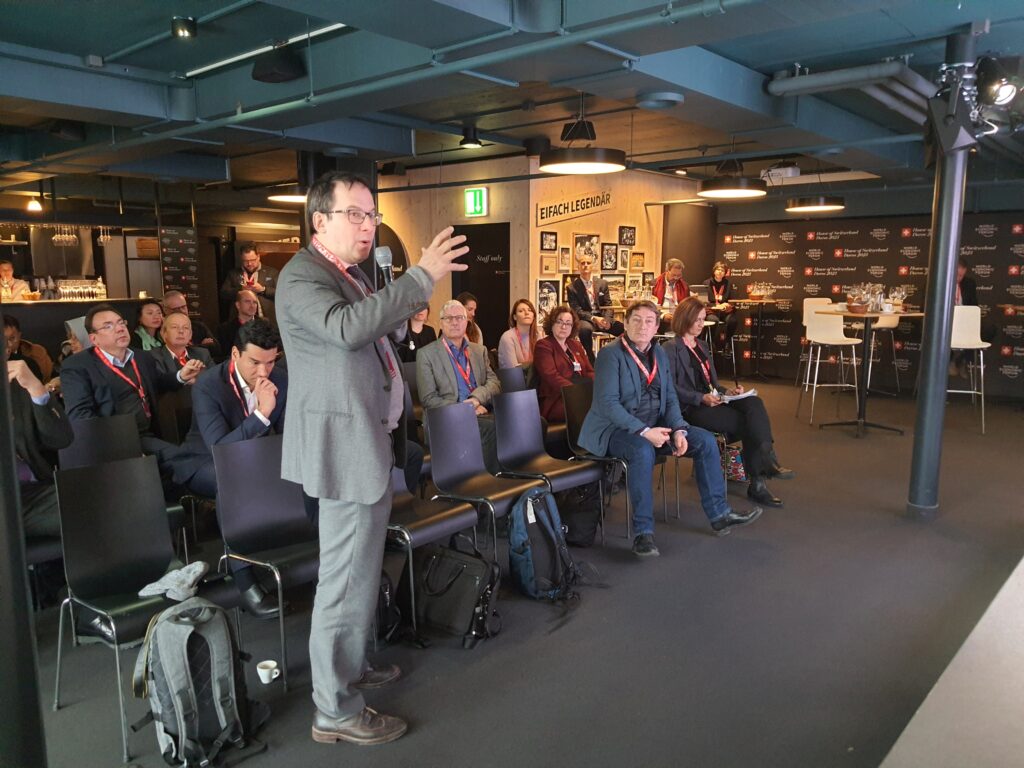
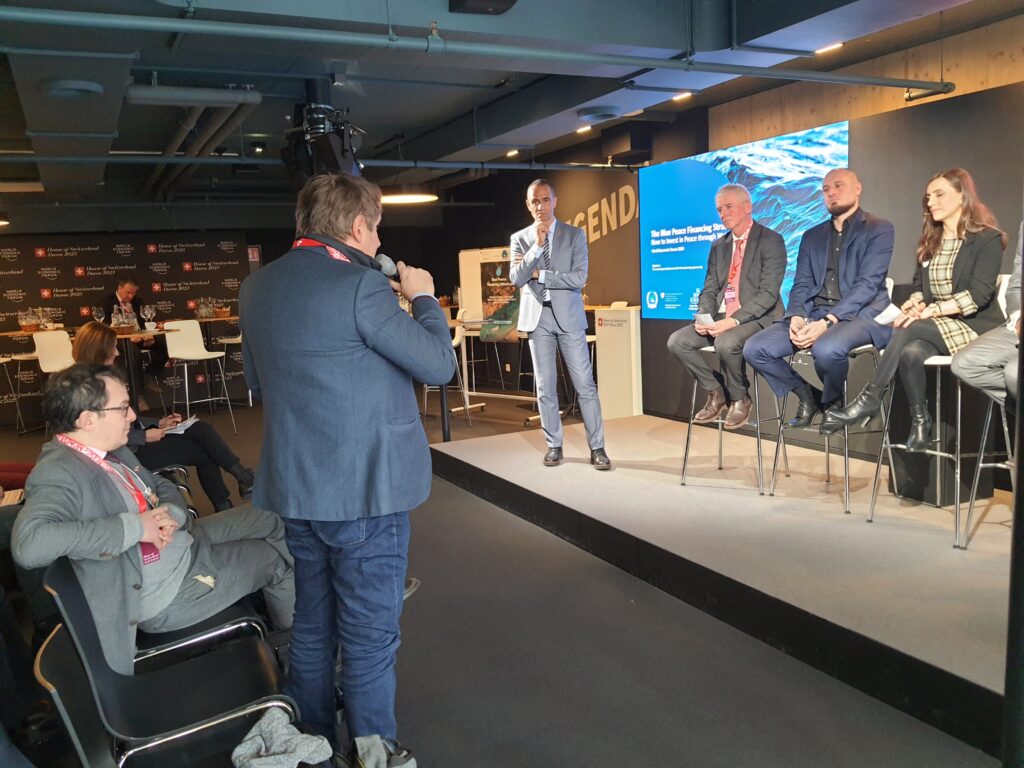
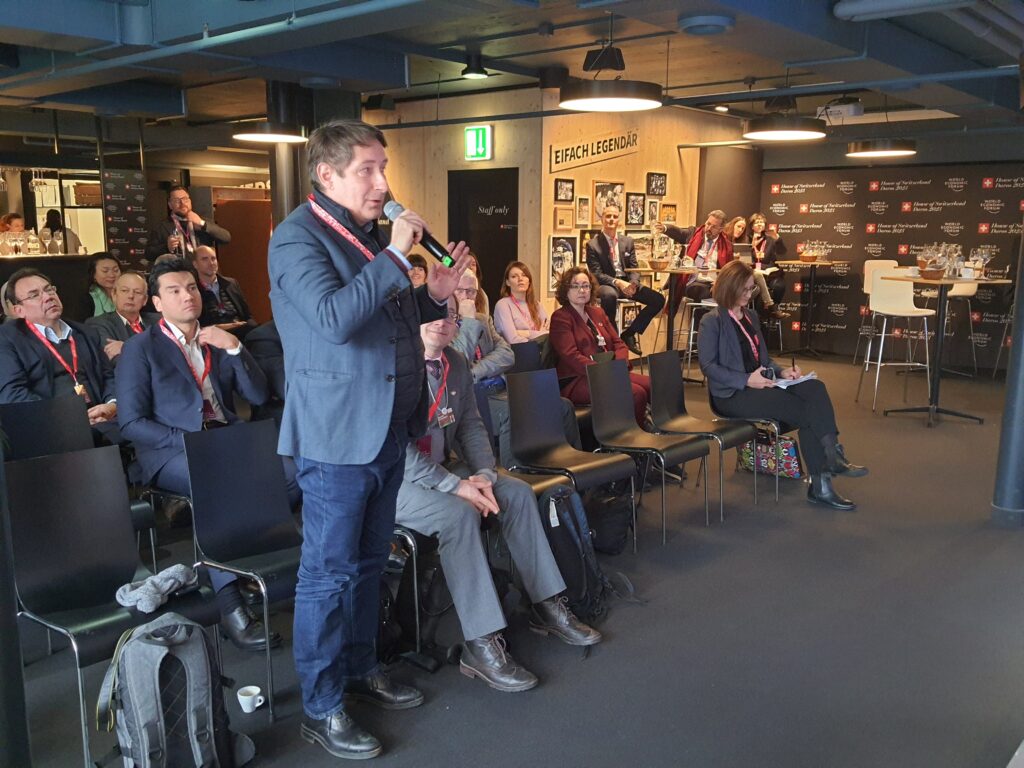
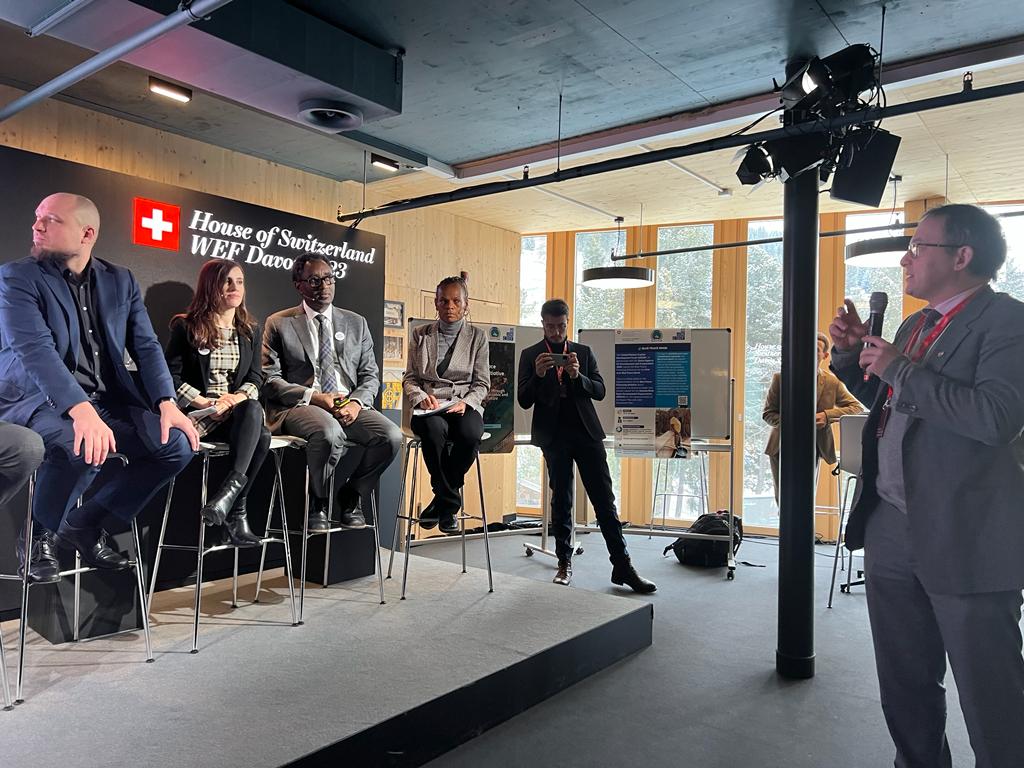
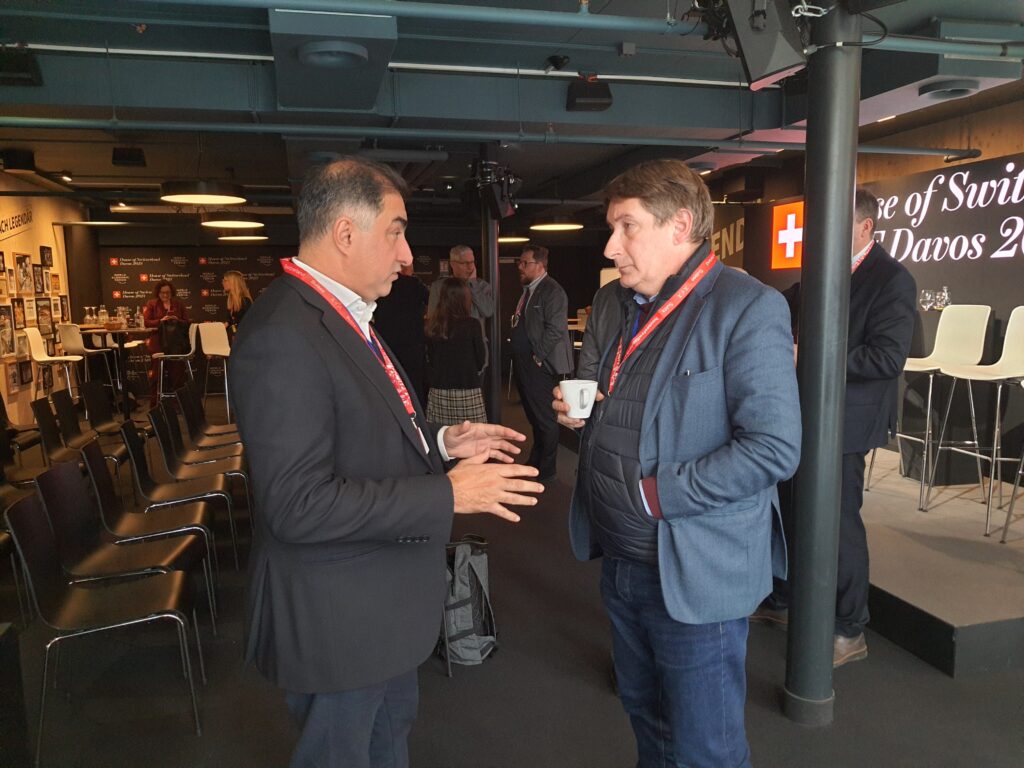
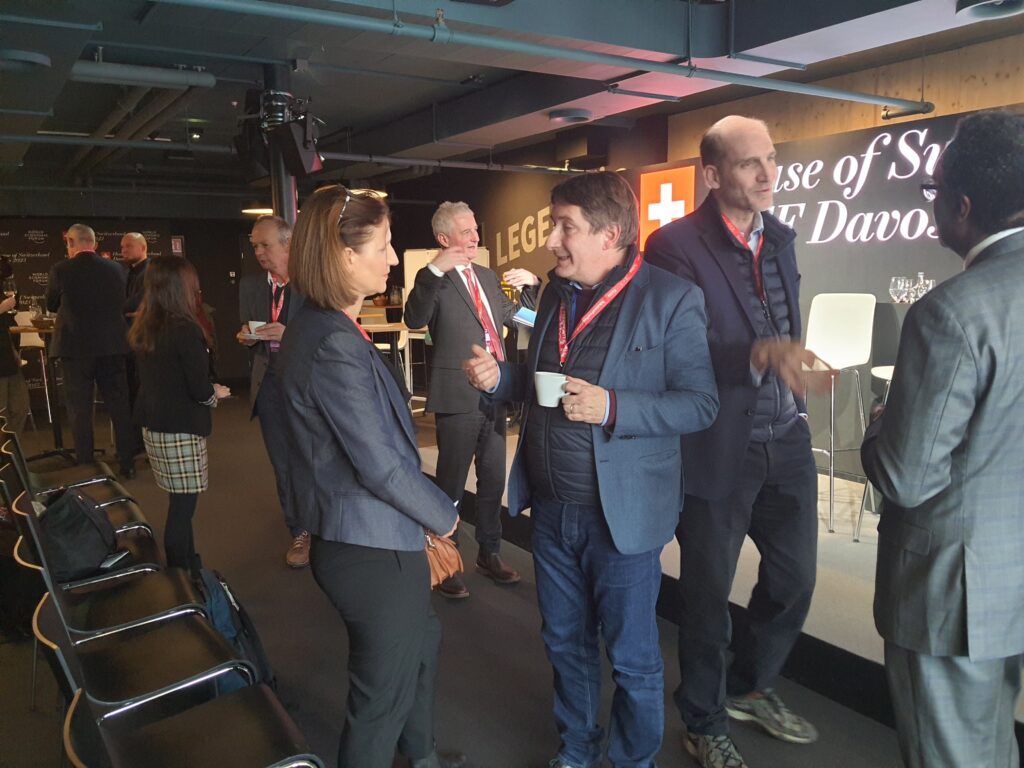
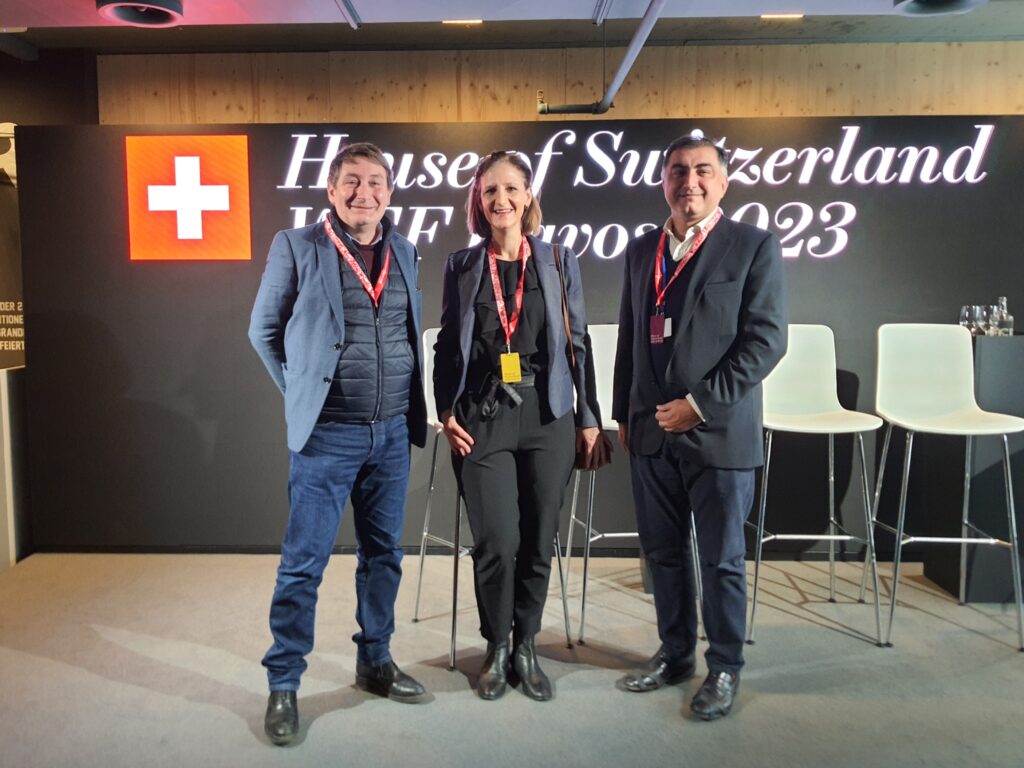
“Chronicle of Three Deaths Foretold” – A call to action for the Fouta Djallon
By Erik Orsenna, Joel Ruet, & Hamed Semega. Published in Diplomatic Courier on March 31, 2023.
“The forested highlands of Fouta Djallon are in danger, and that means six major African rivers, including the Senegal, Gambia, and Niger rivers could dry up with devastating impacts. There are clear, actionable steps we can take to save the highlands, write Erik Orsena, Joel Ruet, and Hamed Semega.
The three deaths are those of the Senegal, Gambia, and Niger rivers.
So are the countries to which they give their names, as without their life-giving waters, the lands reliant on them will dry out and eventually die. It isn’t just Senegal, Gambia, and Niger that rely on these rivers either, it is also countries such as Guinea, Mali, Burkina Faso, and Nigeria.
These rivers flow from a common water tower, one of nature’s treasures—the forested highlands of the Fouta Djallon. These are also home to an additional three transboundary rivers, which are shorter in length but just as vital to the countries that rely on their waters. In times of climate change, Fouta Djallon, home to dozens of sources for each river, is dying a slow and all but invisible death amid the world’s general indifference.
Highlands with Local, Regional, and Global Significance
How could we not support local populations who rely on the Highlands’ resources for food, firewood, grazing land for their livestock? Entangled with chronic misdevelopment, Fouta Djallon’s communities have been left to be frontline actors of the Highlands degradation while being primarily hard hit by its effects.
How could we not take up this regional challenge affecting more than 300 million West Africans whose livelihoods depend upon these rivers which provide electricity, irrigation, transport, and drinking water ?
How could we ignore this threat to global security, as the Fouta Djallon are truly the environmental and strategic depths of the Sahel, the epicentre from which a regained ecosystemically sustainable peace can one day be projected again onto the whole Sahel ?
These are the three scales to be articulated.
The UN Water Conference held in New York from 22 to 24 March provided a unique opportunity to raise the alarm and bring this issue to the attention of the international community. Instead of merely making a diagnosis, we (the authors) put forward for consideration a three-pronged approach for the global community.
A Three-Pronged Approach for Saving the Rivers, Highlands
We (the global community) should support local populations wanting to revisit aspects of their traditional lifestyles in sustainable ways. This means helping local populations adopt new energy sources, better grazing methods, and access more appropriate and sustainable waterpoints. This will require a revitalized organization of socio-economic life of local communities to safeguard both the health of the highlands and their long-term access to those resources.
We should support technological dissemination and data collection in the Highlands to increase environmental and ecosystem knowledge and monitoring. Innovative water catchment systems, observation satellites, new forms of irrigation, or introduction of Sahelian low-carbon agroecological practices are key to meet the pressing need for consolidated environmental knowledge of the region and the development of knowledge-sharing platforms. These efforts must be taken up not by foreign startups but by young African entrepreneurs within regional incubators.
Finally, scaling up these new dynamics cannot be achieved without finance. But the one required is sustainable finance (be it green, blue, or a way to trade dept against environmental results). Such a sustainable finance however relies on this very geo-located data of the hundreds of sources and rich ecosystems of the Fouta Djallon for impact investors to efficiently direct their philanthropy.
To achieve this three-pronged action plan, local authorities, regional environmental entrepreneurs, data, and international sustainable finance and philanthropy are required. This is the new transnational coalition the hundreds of headsprings of these mighty but fragile rivers are crying for, with local communities at the very heart of this system, to take up this transition and with concerted actions between the countries affected and West African river basin organizations. These are already high-performing -one got nominated for the Nobel Peace Prize, two of them are spear-heading innovative blue finance initiatives – and these are good news from the Sahel that deserve support to be rolled out.
It is this safeguarding plan, nay rescue plan, which was exchanged upon for the first time at the headquarters of the UN on 24 March and which now requires the attention of decision makers and financiers everywhere to be carried out,
In “a village one can only leave, the rain does not fall anymore; it is suspended. The river is drying up,” Mozambican writer Mia Couto wrote in his powerful tale A Chuva Pasmada, literally meaning “the stunned rain.” Let us neither remain suspended nor stunned; the future of these three great African rivers is at stake.”
Erik Orsenna
Member of Académie française, Chairman, Initiatives for the Future of Great Rivers (IFGR)
Joel Ruet
Economist at the Institute for Interdisciplinary Innovation (i3), CNRS Chairman, The Bridge Tank
Hamed Semega
former Minister of water in Mali, former High Commissioner of the Senegal River Basin Organisation (2017-2022)
To read about IFGR, The Bridge Tank and OMVS’ side event on “The Fouta Djallon: Visions & Actions to Safeguard the Water Tower of West Africa” at the UN 2023 Water Conference, on March 24, 2023, click here.
The Fouta Djallon Highlands: A call to action & a roadmap for preservation presented at the United Nations
The Fouta Djallon Highlands – the water tower of West Africa – are dying. These forested highlands in Guinea are home to the headwaters of some of West Africa’s largest rivers, e.g. the Senegal River, the Gambia River, and the Niger River. This jewel of nature provides water to a region of nearly 300 million people. Faced with the urgency of the accelerating degradation of the Fouta Djallon’s fragile ecosystems, The Bridge Tank, Initiatives for the Future of Great Rivers (IFGR) and the Senegal River Basin Development Organization (OMVS) joined forces to alert the international community and present a roadmap for action at the United Nations 2023 Water Conference in New York.
On March 24, The Bridge Tank, IFGR, and OMVS organized an official side event on “The Fouta Djallon: Visions & Actions to Safeguard the Water Tower of West Africa” with the official support of France and Guinea, represented respectively by Bérangère Couillard, Secretary of State for Ecology of France and by the Chief of Staff of Aly Seydouba Soumah, Minister of Energy, Hydraulics and Hydrocarbons, Republic of Guinea. The side event was organized in partnership with the French Development Agency (AFD), the French Water Partnership (PFE), the International Network of Basin Organizations (INBO), and the Geneva Water Hub.
Structure of the session:
- Opening addresses by Bérangère Couillard, Secretary of State for Ecology of France, Erik Orsenna, President, Initiatives for the Future of Great Rivers (IFGR) & member of the Académie française, and Joël Ruet, President, The Bridge Tank
- Presentation and assessment of the challenges facing the Fouta Djallon by Soufiana Dabo, Coordinator for Guinea, OMVS and Abderahim Bireme Hamid, Executive Secretary, Niger Basin Authority (NBA)
- The role of river basin organizations and ongoing actions by Lionel Goujon, Head of the Water and Sanitation Division of the French Development Agency (AFD)
- An action plan and a discussion on the solutions to safeguard the Fouta Djallon.
Rewatch the recording of the session on our YouTube channel (in French with English subtitles).
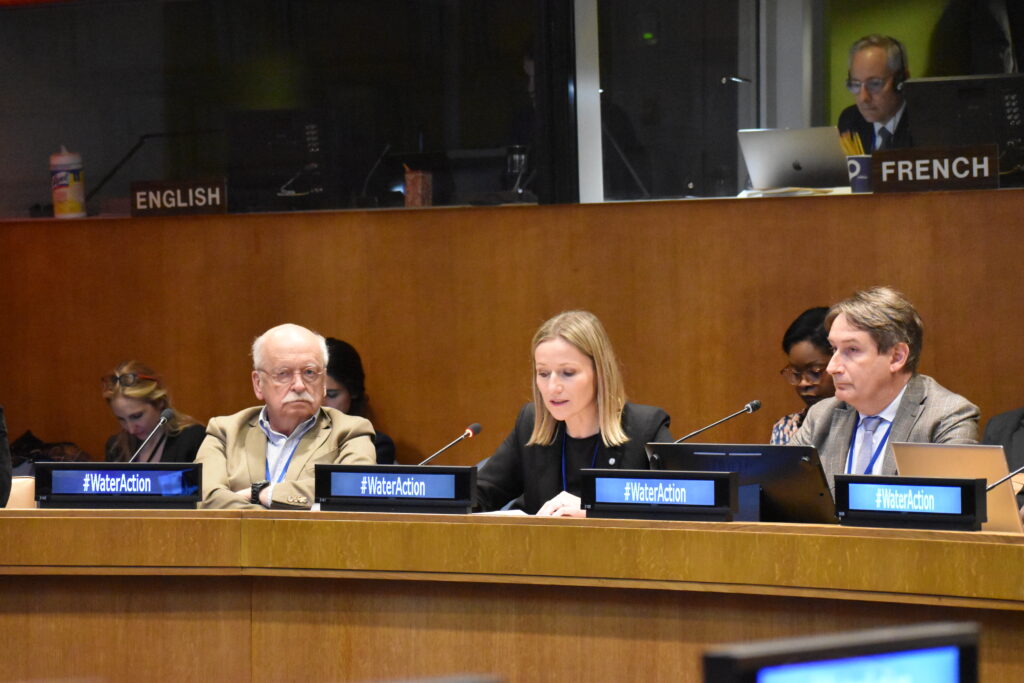
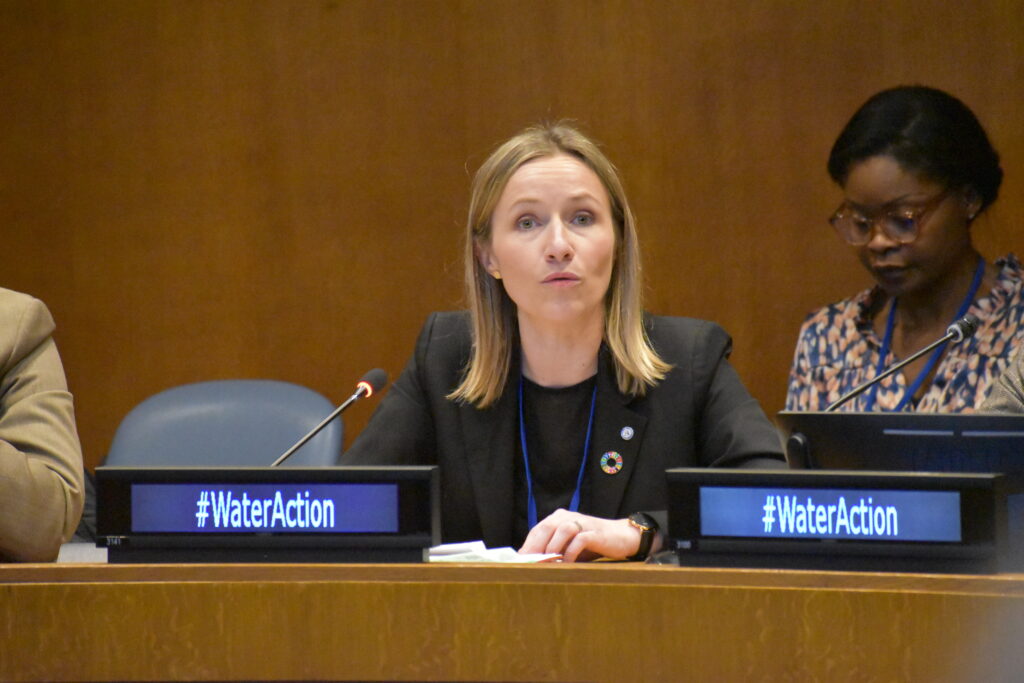
Opening addresses at the United Nations Headquarters
Confirming France’s support for this UN side event moderated by Sophie Gardette, Director, IFGR, Bérangère Couillard, Secretary of State for Ecology, France opened the session with an address to the panel.
In her speech, Ms. Couillard introduced the importance of preserving the Fouta Djallon Highlands and their unique ecosystem in order to protect West Africa’s largest rivers, emphasizing at the same time the interdependence between the preservation of ecosystems and the availability of water, both in quantity and quality. Secretary of State Couillard also praised the work of the region’s river basin organizations, particularly OMVS, and their role in integrated water resources management at the level of transboundary basins.
This was an opportunity to remind the audience of France’s role in the development and promotion of Integrated Water Resources Management (IWRM) and to encourage a multi-sectoral approach, reconciling all stakeholders drawing on the resources of the Fouta Djallon and impacting its ecosystems. In conclusion, Ms. Couillard recalled the importance of the Water Convention and praised the pioneering role of Senegal and Chad, which were some of the first countries outside Europe to join the Convention.
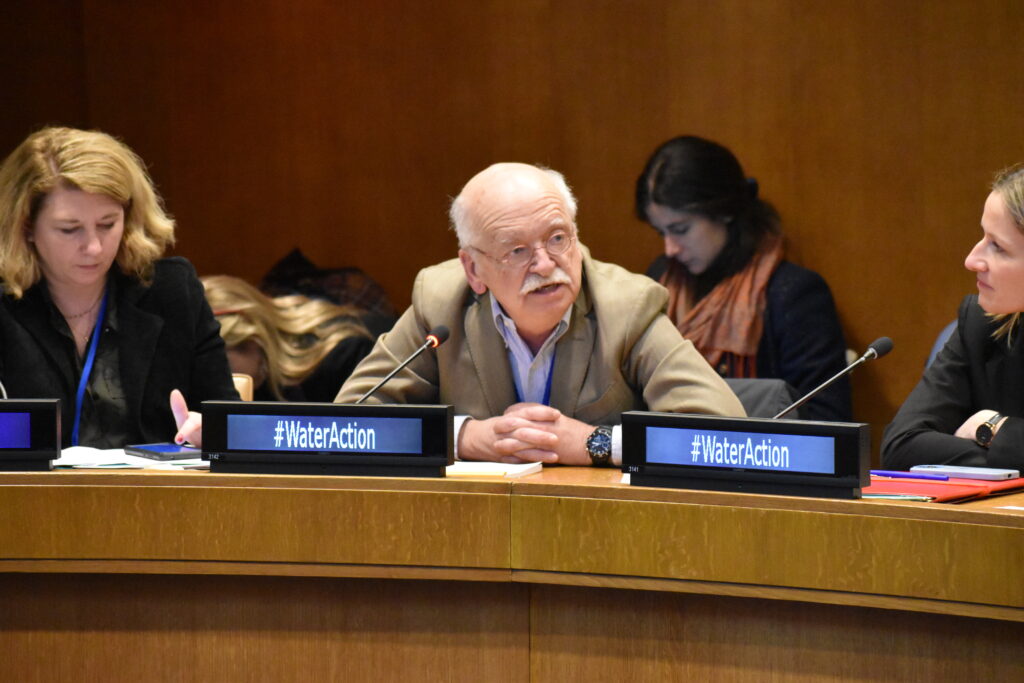
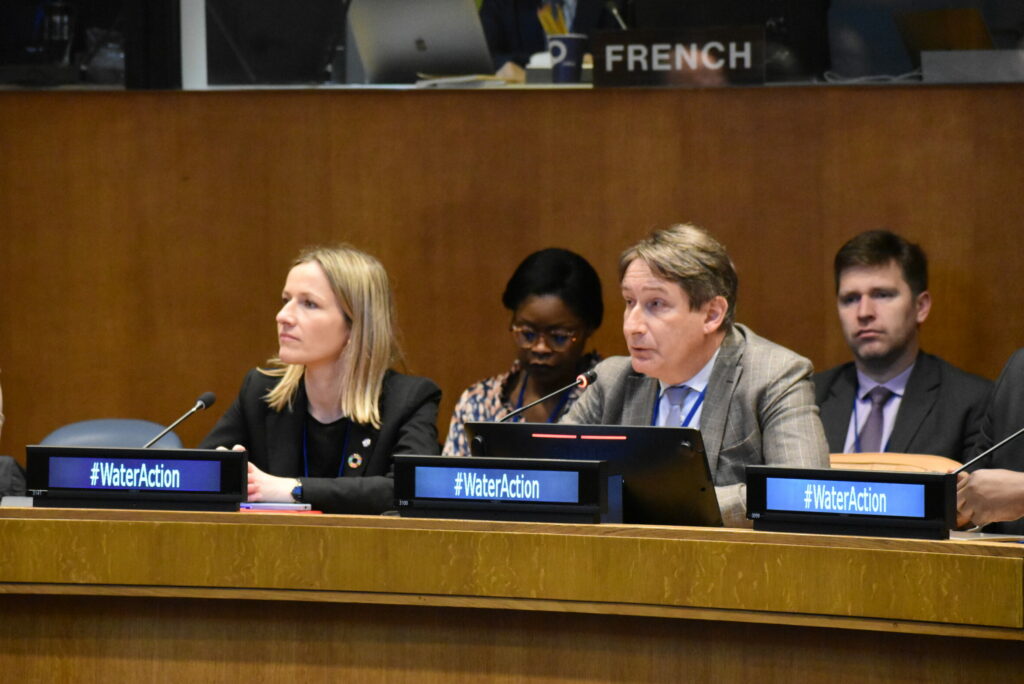
Erik Orsenna – The water cycle and the life cycle
As co-host and co-organizer of this event, Erik Orsenna, President, Initiatives fur the Future of Great Rivers (IFGR) & member of the Académie française, issued a call to action to preserve the forest and river ecosystems of Fouta Djallon. Faced with the complexity and elusive diversity of water, “most essential of all resources,” Mr. Orsenna stressed the importance of using concrete characters and stories to convey the challenges of water resources management and preservation.
Rivers, and in particular the great rivers Senegal, Gambia, and Niger in the case of Fouta Djallon, form this unity of life, these living characters whose stories can be told. Quoting one of his predecessors at the French Academy, Jacques-Yves Cousteau, Mr. Orsenna thus noted that “the water cycle and the life cycle are one.” Biological health, economic health and social health are thus closely intertwined.
This unity of the cycle of water and the cycle of life is also found in Africa: 60% of the drinking water consumed in Dakar and 100% of that consumed in Nouakchott come from the Senegal River. Erik Orsenna also got to experience another theorem when he visited the shores of Lake Chad in Niger: “the less water there is in Lake Chad, the more terrorists there are.” “And it is for these two reasons that we decided to raise the alarm on the Fouta because the Fouta is the source of all this life in West Africa,” Erik Orsenna concluded.
Joël Ruet – Experiences from the field
Offering an account of his trip to the Fouta Djallon with Hamed Semega, former High Commissioner of the OMVS, Joël Ruet, President, The Bridge Tank & economist at the Interdisciplinary Institute of Innovation i3t, CNRS, began his address by paying tribute to Mr. Semega, with whom he went on this field trip and who was the first high commissioner to visit the sources of the Senegal River. The field mission revealed that the men and women, local populations living near the springs, were also suffering from the lack of water. Where there are only picturesque puddles left today, 10 or 15 years ago, these same pools were big enough for an adult to drown in. “It is now a matter of turning a vicious circle into a virtuous circle,” Joel Ruet said, adding that “the solutions are with the people, with the local communities, and it is our moral and human responsibility as an international community to help and support them in their initiatives.”
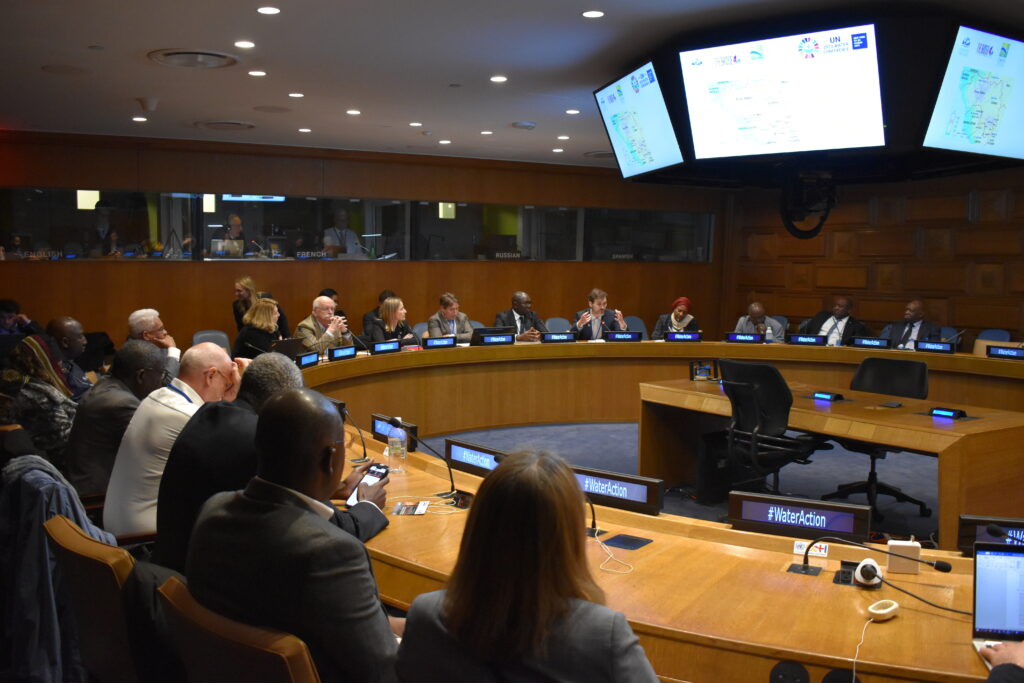
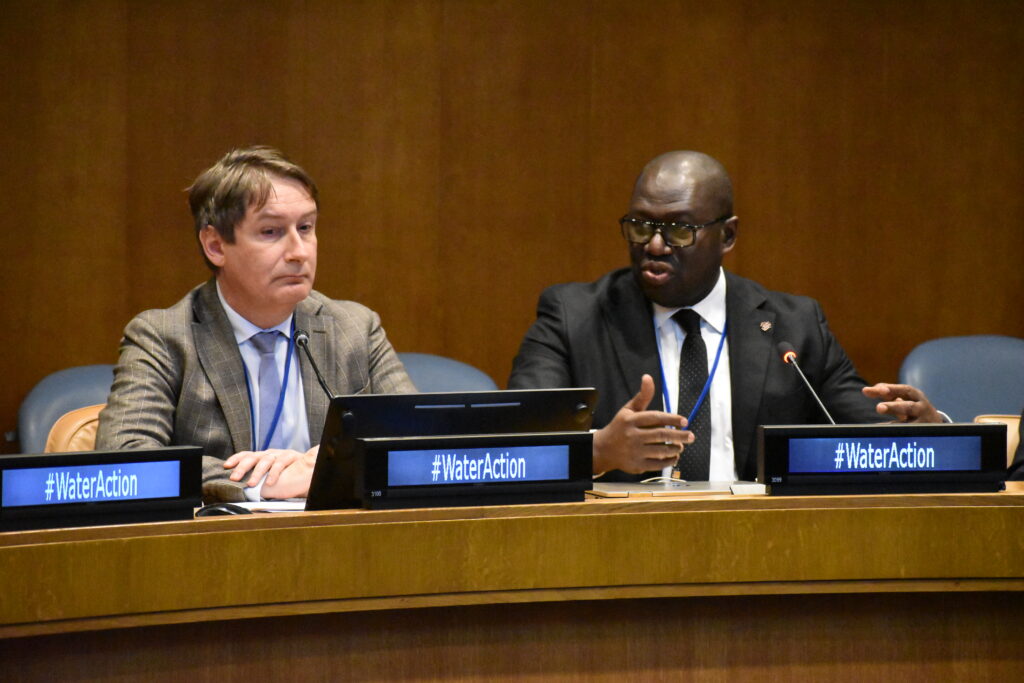
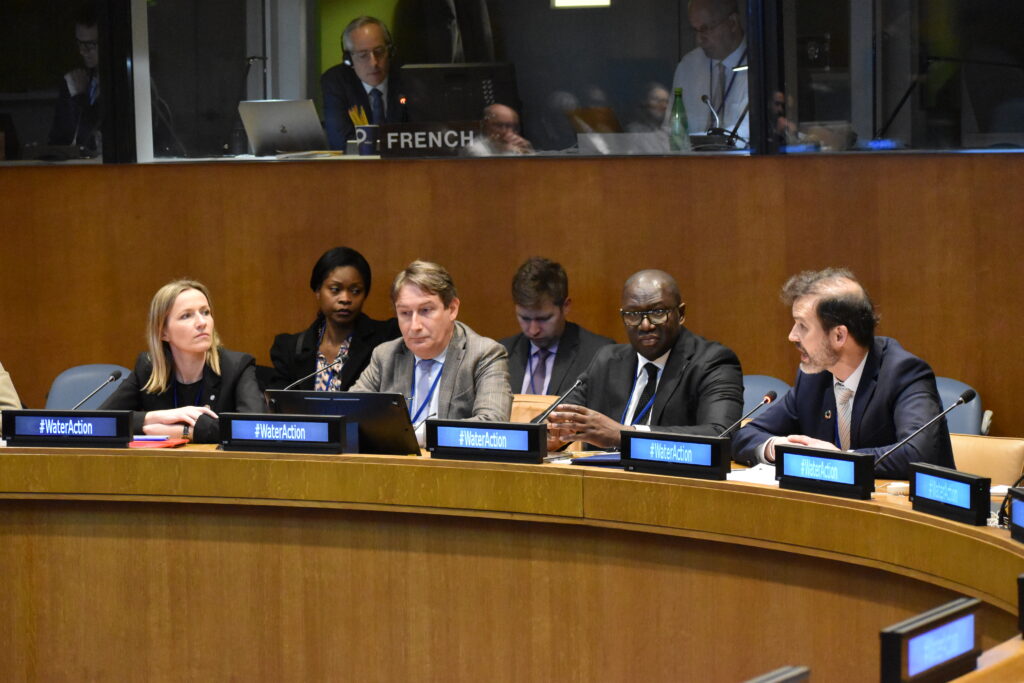
An agonizing Fouta Djallon
Soufiana Dabo, Coordinator for Guinea, OMVS, described the context of the Fouta Djallon before recalling the challenges and threats facing these highlands which are home to the sources of the Senegal River, the Gambia River, the Niger River and other smaller rivers. This mountainous territory in the north of the Republic of Guinea and extending towards Senegal, Mali and Guinea-Bissau is found at altitudes ranging between a little over 500 and 1515 meters, culminating on Mount Loura. The unique ecosystem of Fouta Djallon is now endangered and many endemic species, both fauna and flora, are growing rare.
The region is inhabited by sedentary farmers and herders whose activities coexist. However, demographic pressure has driven people closer to water sources in order to meet the growing need for water for agriculture and for the daily consumption of both communities and livestock. This growing pressure on sources has led to a decrease in the available water quantity but also to the degradation of riverbanks, impacting both Guinea upstream and the countries and 300 million people living downstream.
Abderahim Bireme Hamid, Executive Secretary, Niger Basin Authority (NBA), also noted additional degradation on the highlands inflicted by man. These include, for example, the production of baked bricks, excessive logging, and mining, particularly traditional gold mining.
The reduction of vegetation cover and the degradation of soils – a consequence of overgrazing and agricultural practices inappropriate to the demographic context, such as slash-and-burn agriculture and the reduction of the time these lands lie fallow have also contributed to the fragility of Fouta Djallon. These unsustainable agricultural and forestry practices reduce the forest cover and dry out the soil, threatening the stability of the ecosystems of the Fouta Djallon. These dynamics accelerate desertification and the silting up of waterways and of their springs, thereby also reducing the absorption capacity of soils. The threat is also environmental, since climate change affects the rainfall and the particular microclimate of Fouta Djallon, with temperatures constantly rising.
“Together we must mobilize our actions, efforts, awareness, and knowledge around what needs to be done now to restore this ecosystem […], to raise people’s awareness but also to allow them to continue their activities without being in conflict with nature,” Mr. Dabo concluded.
“If we do not act proactively to change the situation and to revive the Fouta Djallon highlands, the risk will impact all of these countries (the 9 member states of the NBA) and all of these populations in Africa,” Mr. Hamid concluded.
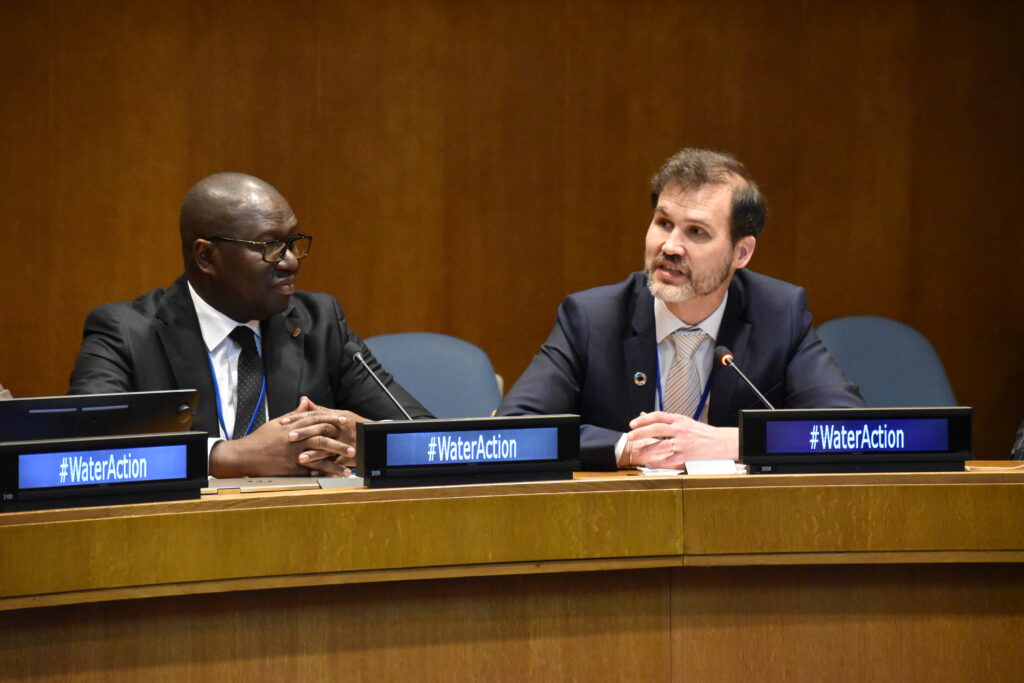
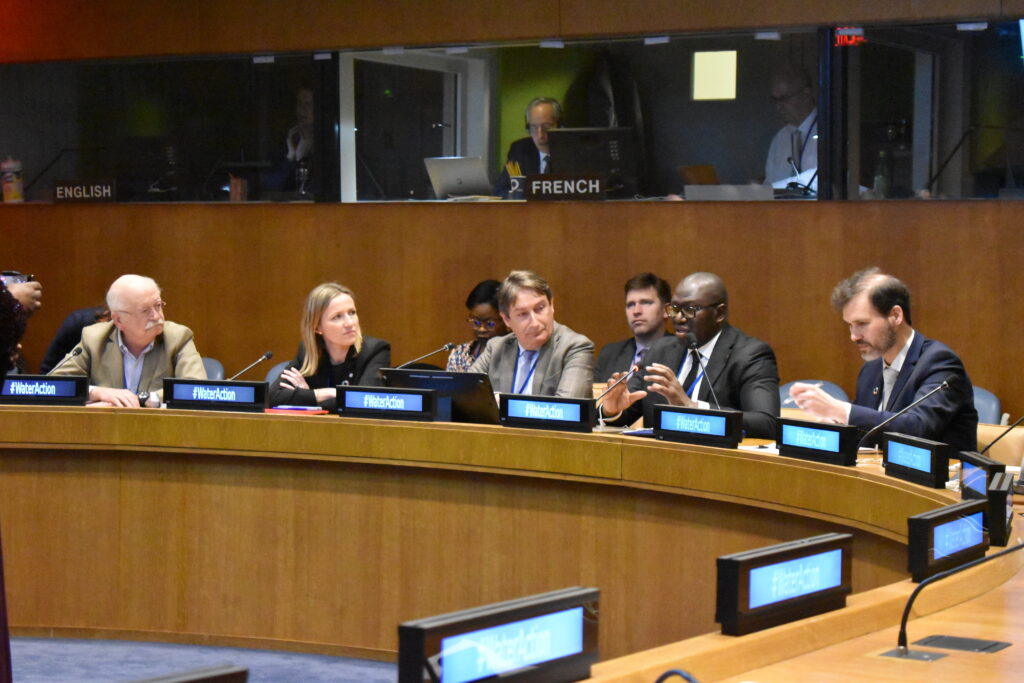
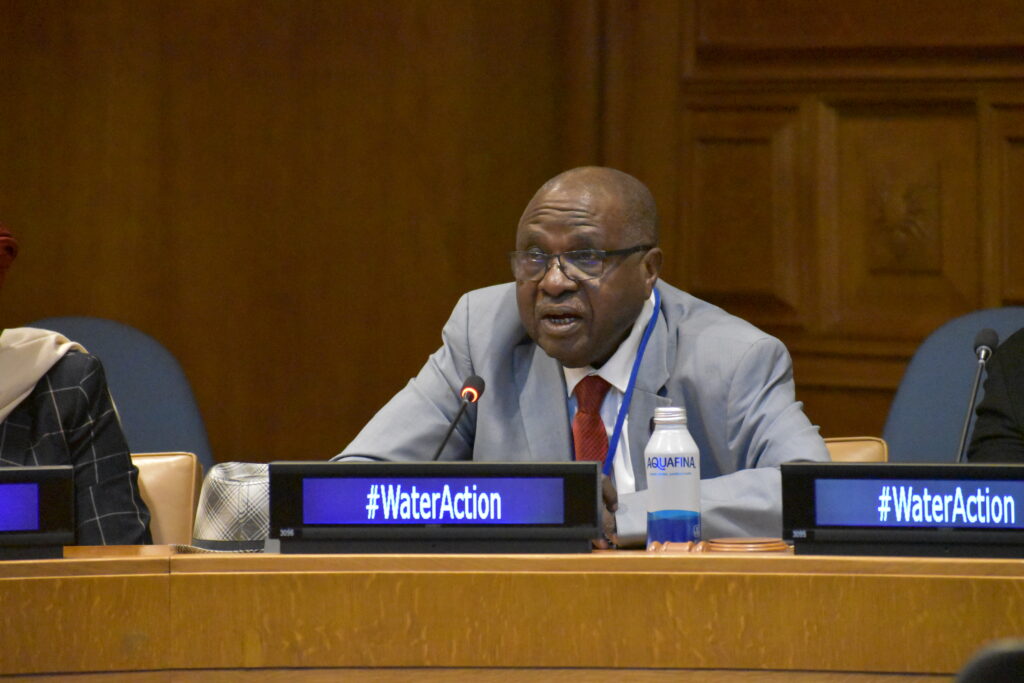
River basin organizations at the heart of preservation efforts
Lionel Goujon, Head of the Water and Sanitation Division of the French Development Agency (AFD) presented the existing preservation and sustainable management initiatives as well as the actions already carried out in the field by the AFD. These have been developed and carried out in partnership with the various basin organizations of the region. The presence of senior officials of these basin organizations, with Mr. Soufiana Dabo for the OMVS, an organization that AFD has been supporting for about 40 years, and Mr. Abderahim Bireme Hamid for the NBA, with which AFD has been collaborating for about 20 years, illustrated the investment and the central role of these organizations in the management of water resources and the preservation of the region’s ecosystems.
It is about avoiding the tragedy of the commons and the unfolding tragedy of Fouta Djallon, Mr. Goujon stated, referencing Elinor Ostrom, Nobel Prize in Economics in 2009. The challenges in the conservation efforts are numerous: lack of knowledge about the declining resource and its ecosystem, lack of measurements, and lack of data on the consequences of ongoing hydrological changes, as well as the need for new technologies and human resources and devices to maintain measurement networks.
AFD’s action in partnership with basin organizations is structured around projects such as the SCREEN project with OMVS, a project of altimetric measurements with satellite technologies in collaboration with French actors like CNR, IRD, BRL, and CNES. The DYNOBA project for the revitalization of transboundary basin organizations in Africa encourages the sharing of experiences between basin organizations. The Fouta Djallon could be a field of application of this exchange. AFD is also currently working on a project to support Guinea’s national meteorological services to strengthen national meteorology and produce more reliable data.
“There are several levels to work on: institutional, international, national, and local with the populations in order to have a beneficial impact on this region,” Mr. Goujon concluded.
An action plan for the Fouta Djallon
The objective of this side event was not only to alert the international community on the alarming situation of a dying Fouta Djallon but also to present an action plan and the key avenues of action for the preservation of the highlands. Joel Ruet, President, The Bridge Tank & economist at the Interdisciplinary Institute of Innovation i3t, CNRS presented some essential features of such an action plan.
- Supporting and mobilizing local communities by establishing a catalogue and an academy of durable best practices, combining both traditional and modern agricultural and ecosystem preservation methods, e.g. resilient agroforestry, to raise awareness and train local populations;
- Fostering local and regional research and innovation to increase knowledge and data of the Fouta Djallon’s resources and ecosystems. This will be achieved by establishing and supporting incubators of technological startups, supporting academic research projects, local environmental engineering, and the development of nature-based solutions;
- Fostering political will and regional cooperation by creating an assembly of West African states, RBOs, and multilateral organizations, backed by the international community, for the Fouta Djallon to develop a regional cooperation framework around this common resource and ensure social, societal, and environmental sustainability in the highlands and across the region;
- Mobilising new green finance mechanisms in support of the Fouta Djallon by establishing a green-blue bond dedicated for the preservation of biodiversity and the development of the highlands with international support.
In the continuity of the actions already implemented, concerted action across the sub-region to preserve the Fouta Djallon will have to involve basin organizations. The issue of governance was also highlighted by Lionel Goujon, who advocated for a governance at different levels, involving basin organizations, states and sub-regional economic communities. “There is a need to create coalitions and cooperation platforms today,” Joël Ruet stressed, which will necessarily involve local communities, in order to determine which traditional methods need to evolve and what traditional knowledge can be mobilized as more sustainable and resilient farming or agroforestry methods. According to Soufiana Dabo, the priority is to adapt and rethink existing solutions.
A tool which will play an important role in this process is the Fouta Djallon Observatory set up by the OMVS. According to Mr. Dabo, it will allow to observe, analyze and act in the Fouta Djallon. Soufiana Dabo took the opportunity to call for support of the Observatory as a center of research, reflection and data collection necessary for the evolution of the highlands. This evolution aims at accompanying the communities in their transition, either towards other activities that will have less impact on the ecosystem of the highlands, or to modernize current practices and activities undertaken by local populations. Within the framework of its IWRM programs, OMVS has launched the first initiatives in this direction, including agricultural development projects and the establishment of irrigated and fenced areas to settle the population. The rehabilitation of fish reserves hopes to turn fishing into an alternative source of income.
“We must not oppose socio-economic and human development to nature and the environment,” Joël Ruet insisted.
Finally, a last community that needs to be mobilized are the young graduates of the region’s universities. Mr. Ruet emphasized the importance of local technological entrepreneurship. The support of incubators of young local entrepreneurs returning to the field after their studies would provide the human resources to sustain the measurement and data collection systems necessary for all preservation efforts. This data can also be mobilized for sustainable finance mechanisms that enable, according to Mr. Ruet, “transformational changes going to scale.”
This session is part of The Bridge Tank’s long-standing commitment to the preservation of the Fouta Djallon. At the World Water Forum in Dakar in March 2022, The Bridge Tank and IFGR had already co-organized a session on the issue of safeguarding the Fouta Djalon highlands, in partnership with OMVS and Organisation pour la Mise en Valeur du Fleuve Gambie (OMVG). Previously, Joel Ruet, President, The Bridge Tank, had also participated in a field mission in the Fouta Djalon led by our board member Hamed Semega, then High Commissioner of OMVS.
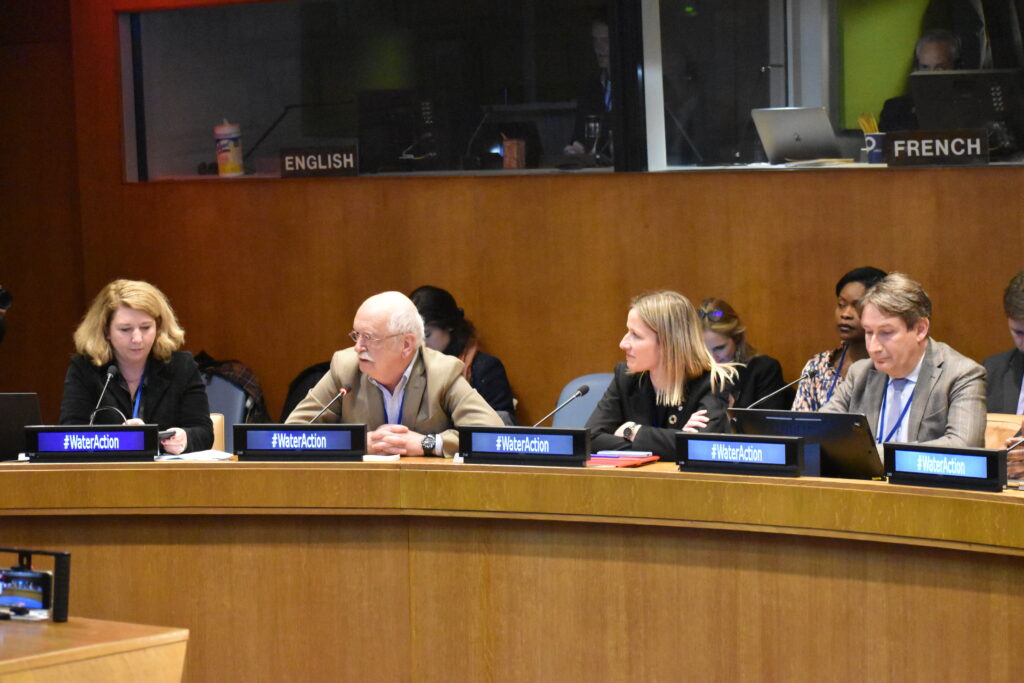
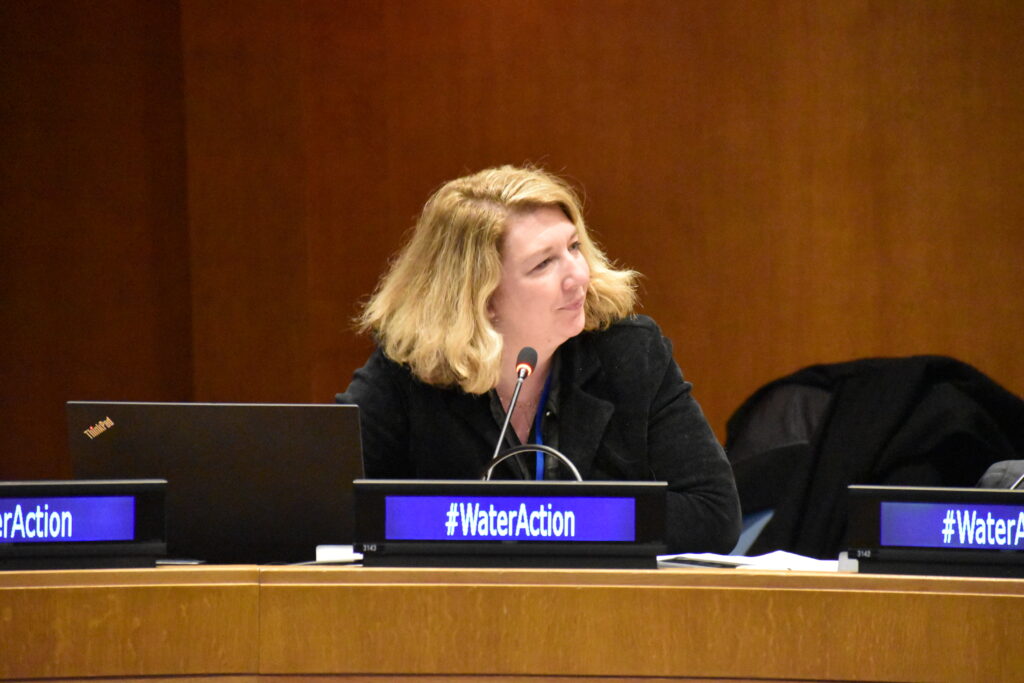
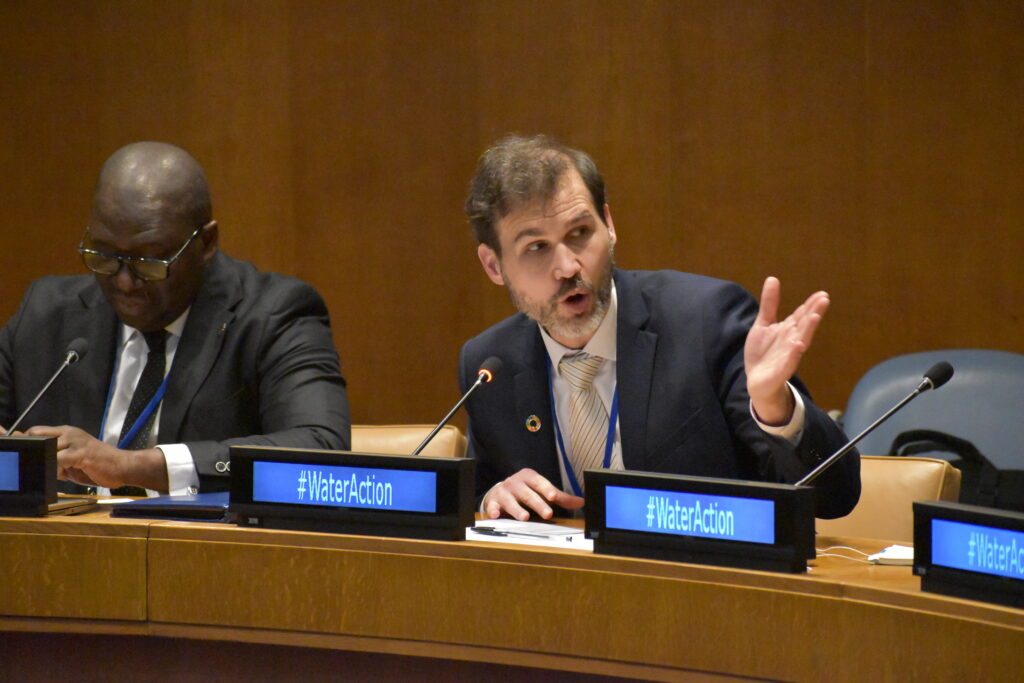
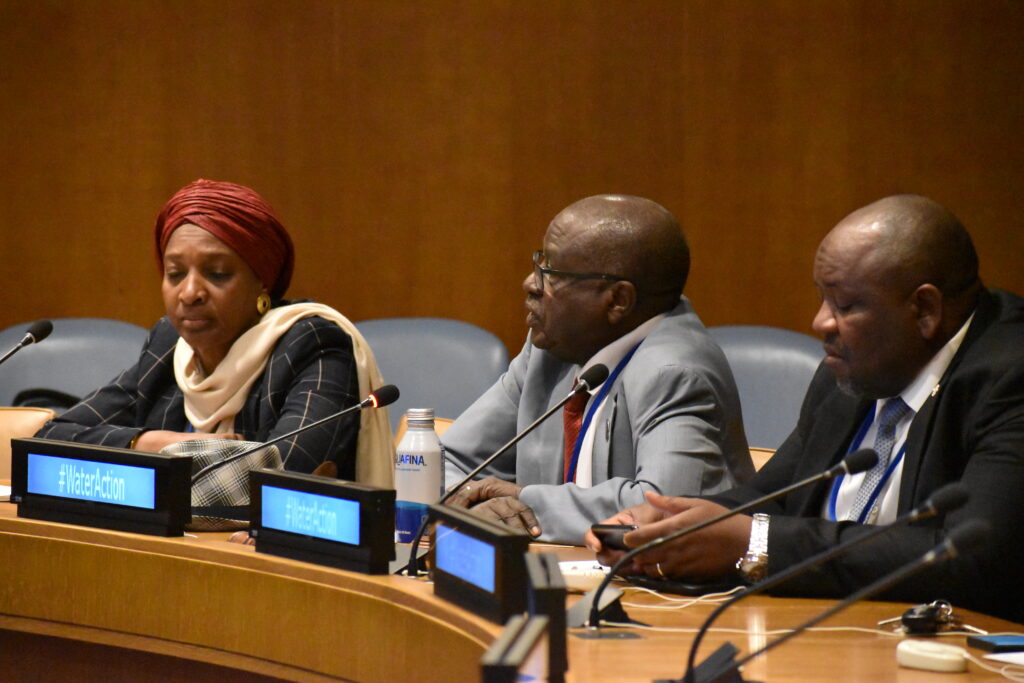
CGTN – Joel Ruet discusses China-EU relations and Chinese growth during Boao Forum 2023
During this year’s Boao Forum for Asia 2023, Joel Ruet, President of The Bridge Tank, spoke with CGTN on three occasions, discussing Chinese PM Li Qiang’s speech during the forum and sharing his insights on current dynamics in EU-China relations.
In a first interview, Joel Ruet shared his analysis of Chinese PM Li Qiang’s speech during the forum’s opening ceremony. Mr Ruet noted that the speech “stressed continuity” in China’s economic policies & growth, presenting it as an “area of certainty” in a world of uncertainty. The role of Chinese growth in global growth will however require caution in the coming 2 years, as the past year saw a slight dip in domestic and foreign investments, which will most likely impact future growth. As noted by Joel Ruet, PM Li Qiang’s speech acknowledged the need for continued foreign investments to balance this out.
In a second interview, Joel Ruet gave a short overview of current dynamics in EU-China partnership, competition, and rivalry, noting the role of values for both the EU and China in the structuring of their relationship.
Finally, Joel Ruet sat down with CGTN’s Xu Qinduo on CGTN Dialogue to discuss China-EU relations ahead of French President Emmanuel Macron and European Commission President Ursula von der Leyen’s visits to China.
The Bridge Tank at BOAO Forum for Asia 2023: Advancing EU-China cooperation and energy transitions
From 28 to 31 March 2023, The Bridge Tank, represented by its president Joël Ruet, took part in the BOAO Forum for Asia 2023, in Boao, Hainan, China. The Bridge Tank has taken part in the annual meeting of the “Chinese Davos” as a partner of the event since 2018. This year’s BOAO Forum was placed under the theme “An Uncertain World: Solidarity and Cooperation for Development amid Challenges.”
The Forum saw Joël Ruet take part in two sessions dedicated to the China-EU dialogue, with a closed-door CEO roundtable, and a panel session on global energy supply shocks, both concretely addressing energy transitions. The forum’s plenary session provided contributions from Chinese Premier Li Qiang, former UN Secretary General and now chair of the forum Ban Ki Moon, as well as Lee Hsien Loong, Prime Minister of Singapore, and Pedro Sanchez, Prime Minister of Spain, addressing future relations between China and the EU and the potential for partnerships.
China-EU CEO closed-door Dialogue
The roundtable which Joël Ruet took part in addressed questions and opportunities of cooperation and competition in a context of systemic rivalry. The session allowed for interaction between industry captains from France, Italy, Finland, Hungary, & Germany and their Chinese counterparts. These notably included:
- Justin Yifu Lin, Dean of Institute of New Structural Economics, Peking University & former Chief Economist and former Senior Vice President of the World Bank
- Li Zixue, Chairman and Executive Director, ZTE Corp
- Zhang Yue, Chairman, BROAD Group
- Li Yong, Chairman, Chinayong Investment Group
- Joël RUET, Chairman, The Bridge Tank & Associate Researcher, Tech for Change Chair Ecole Polytechnique
- Jorge Toledo, Ambassador of the European Union to China
- Denis Depoux, Global Managing Director, Roland Berger
- Norbert Csizmadia, President, John von Neumann University Foundation
- Gianni Di Giovanni, Chairman, ENI China B.V. & Executive Vice President, ENI
- Fabrizio Ferri, Head of Asia Pacific Region, Fincantieri
Joël Ruet’s participation to this roundtable allowed him to convey the current situation and opportunities in matters of energy transitions, particularly around nuclear power and hydrogen. Reflecting on current trends, Mr Ruet noted that in 2022, the EU’s transition found a winning long term hedging strategy based on geographically hedged gas instead of oil, with a 2030 horizon hedging against all fossil fuels.
On matters of climate finance, Joël Ruet argued that financial mechanisms had to go beyond carbon pricing and beyond mitigation finance. Instead, adaptation must be financed through cobenefits on agriculture, agro-forestry, CO2 fixation in soils and water preservation. This requires a joint effort to build a finance and banking derisking industry both at the level of public and commercial banks. China and the EU have a common interest in not only sharing ideas and models but also in building joint programs with least developed countries, Mr Ruet argued.
In a subsequent interview for China Business News, Joël Ruet stressed the importance of these types of roundtables, as “business decisions are based on this kind of relationship and understanding between people.”
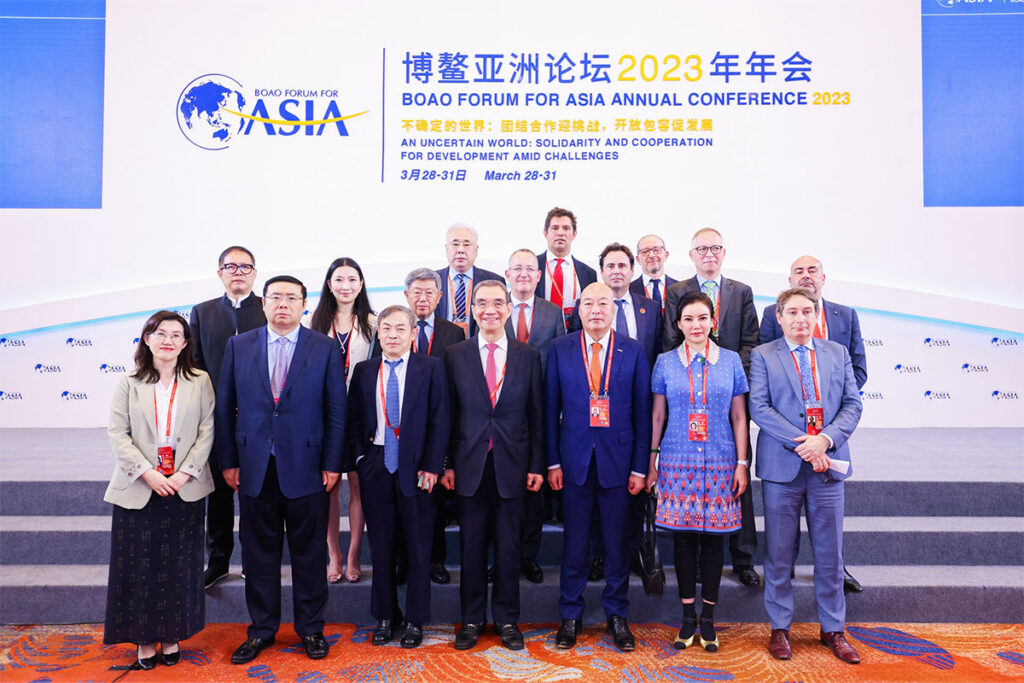
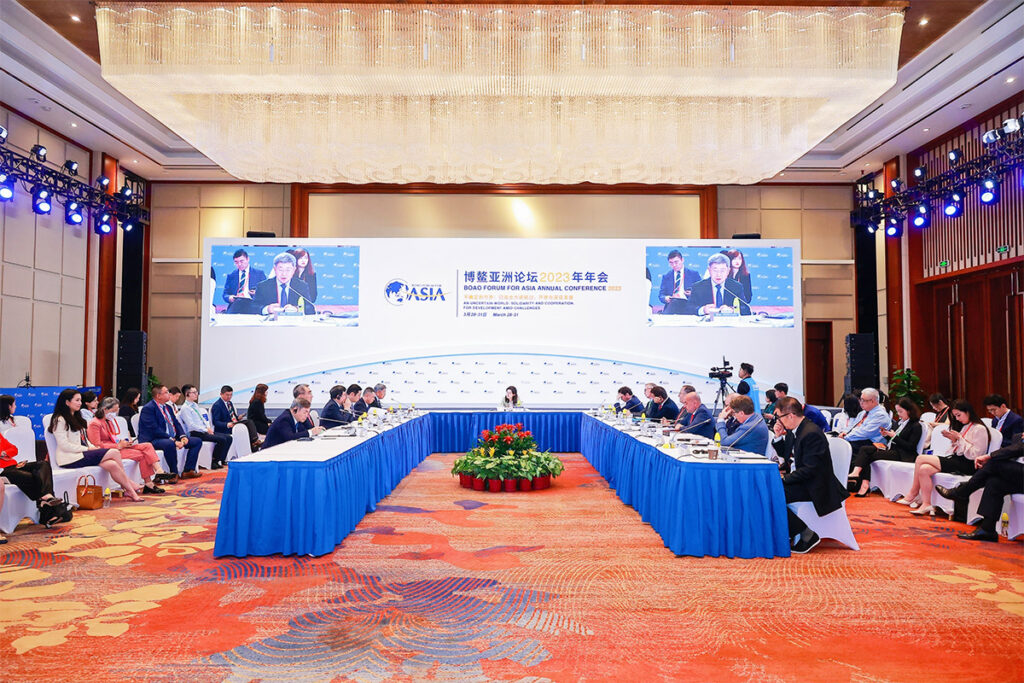
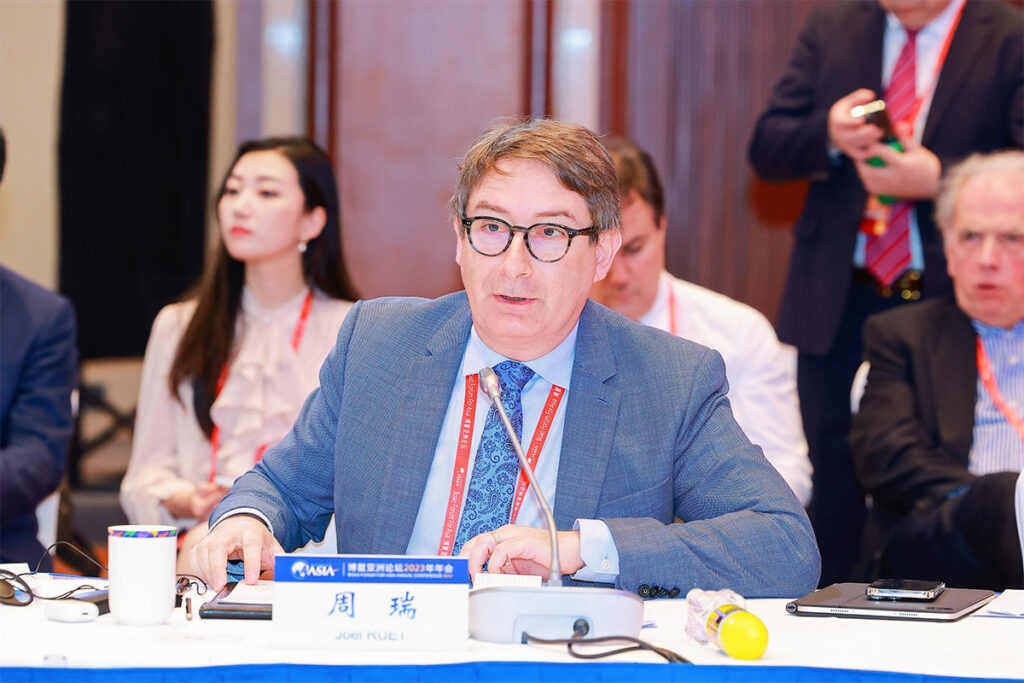
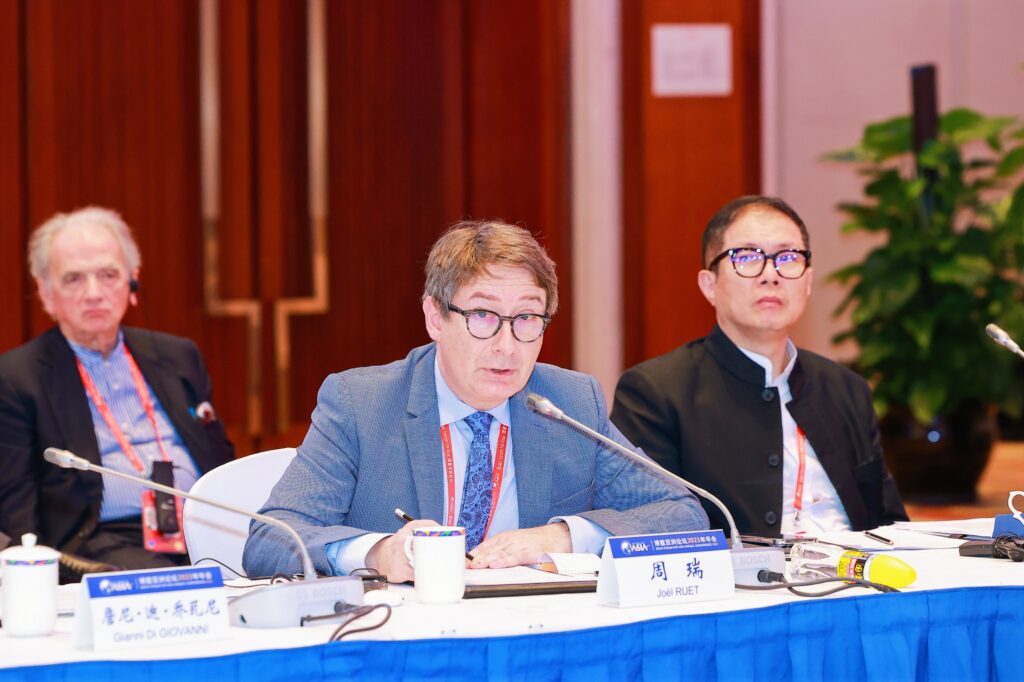
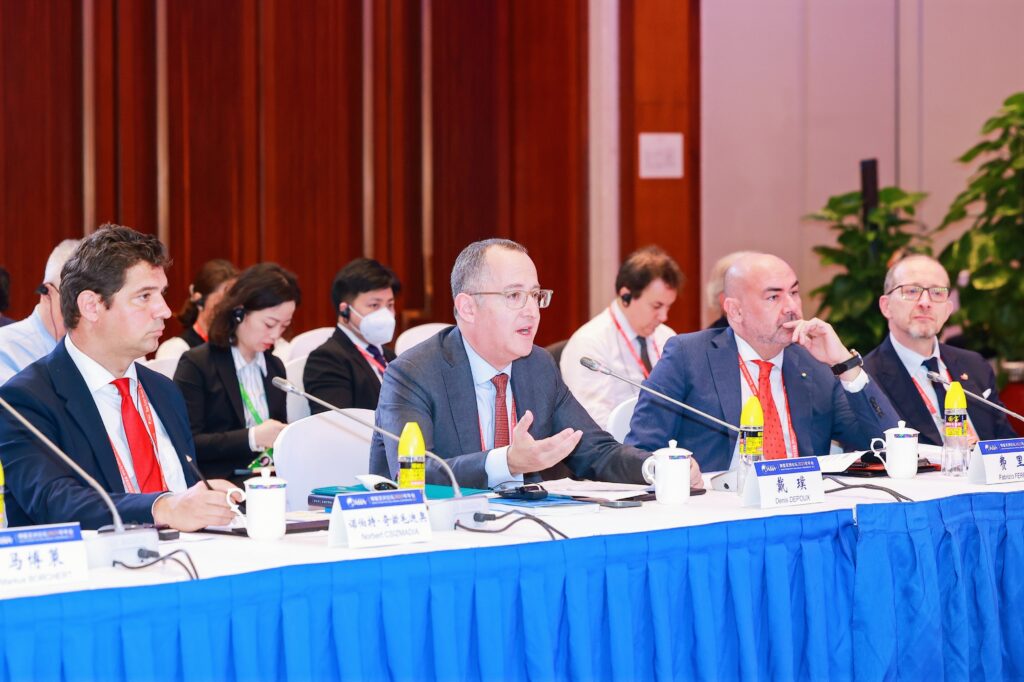
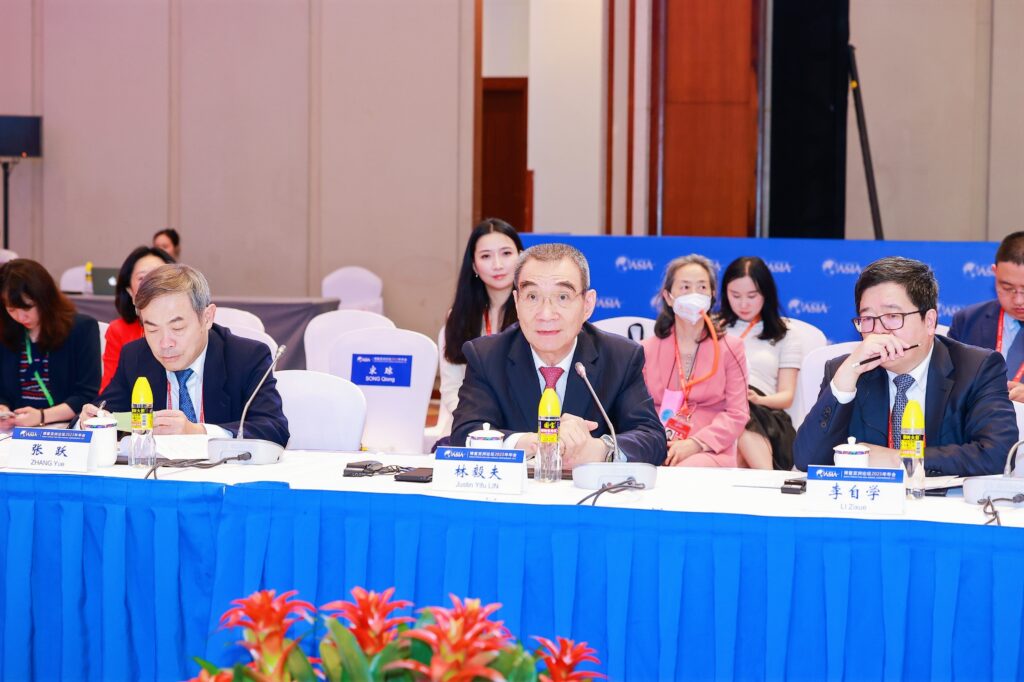
Global Energy Supply Shock Roundtable
On March 30th, Joël Ruet sat down with senior Chinese and international executives and experts for a roundtable discussion on the current energy supply and demand structure. The discussion touched on how Russia’s invasion of Ukraine reshaped Europe’s energy supply landscape and how the global energy structure has evolved since, taking into account sanctions imposed on Russia and production restriction policies adopted by oil producing countries in the Middle East. The session also tackled how to maintain the stability of the international energy market and what the implications of these changes are on energy transitions efforts around the world.
The session moderated by ZHONG Shi, CGTN Anchor, was joined by :
- Denis DEPOUX, Global Managing Director, Roland Berger
- Gianni Di GIOVANNI, Chairman, ENI China B.V. & Executive Vice President, ENI
- MENG Zhenping, Chairman, China Southern Power Grid
- Joël RUET, Chairman, The Bridge Tank & Associate Researcher, Tech for Change Chair Ecole Polytechnique
- Ernie THRASHER, Director, Xcoal Energy & Resources
- ZHONG Baoshen, Chairman, Longi
According to Joël Ruet, the energy crisis is an opportunity to better understand the strengths and weaknesses of current energy structures, what is resilient, and what is most affected by these shocks. “We should turn the crisis into an opportunity,” Mr Ruet stated, adding that “in the energy transition, we must be inclusive and united.” What is stirking in the EU’s response over the last year is that it was not just a short term shock answer but that it paves the way to structural acceleration in energy transition, notably on pure renewables or gas. The fact that various countries have various energy strategies on nuclear as renewable or hydrogen uses or mobility engines hasn’t prevented quantum jumps in taxonomy and serves a positive complement thus hedging in European energy transitions.
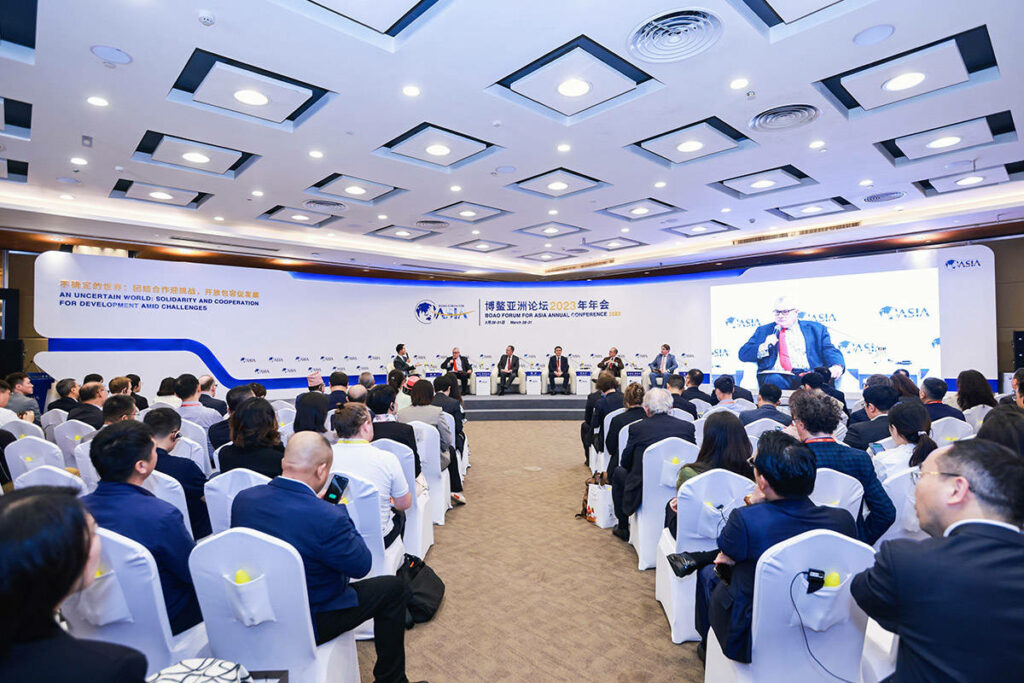
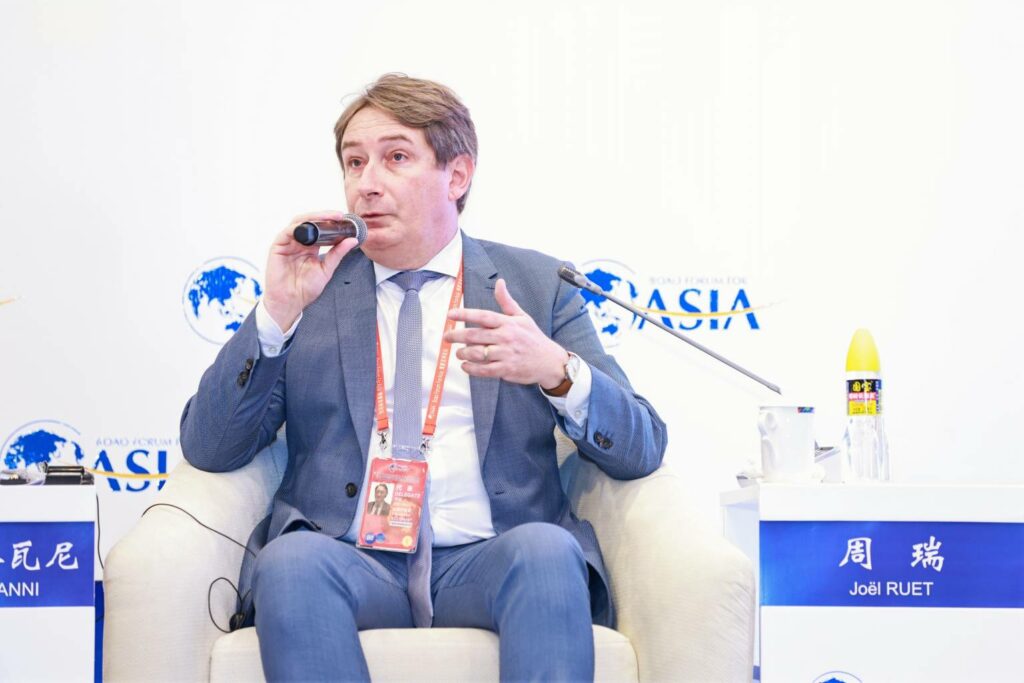
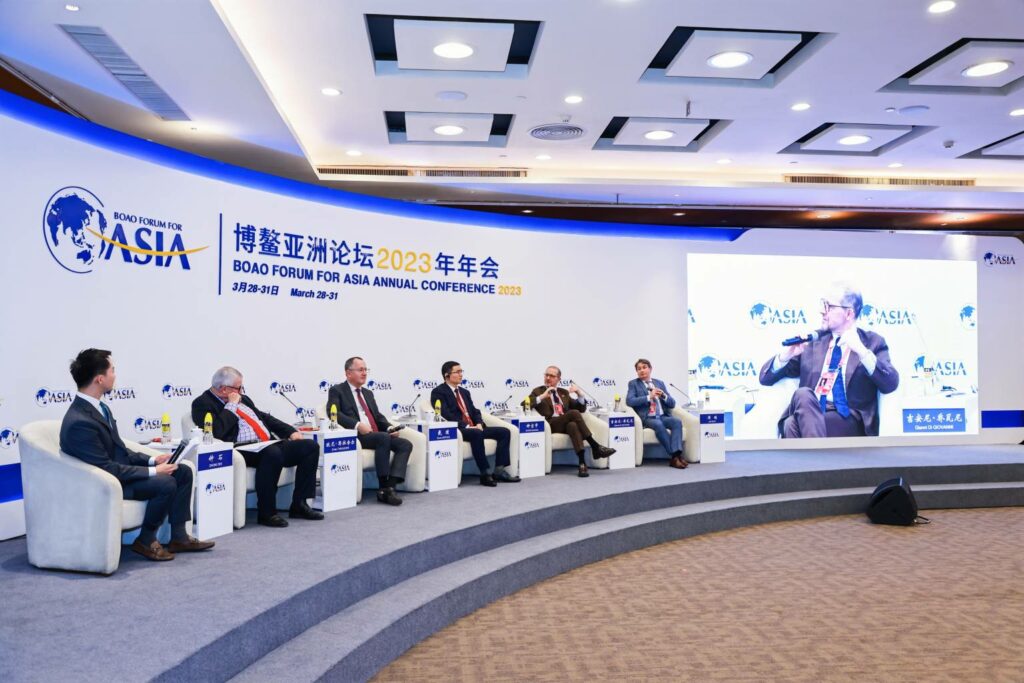
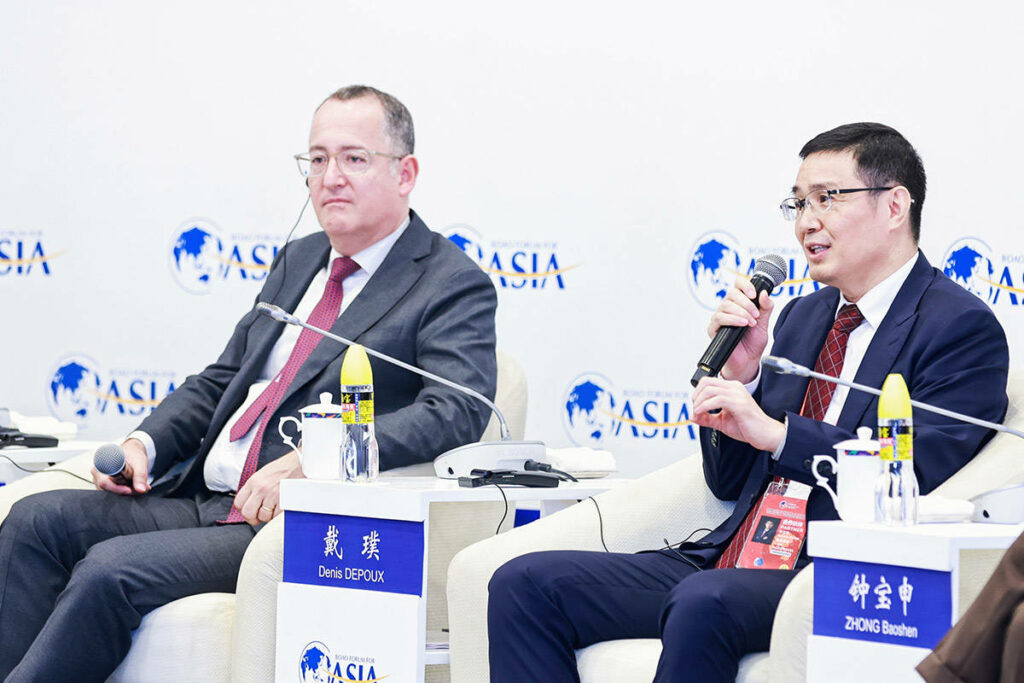
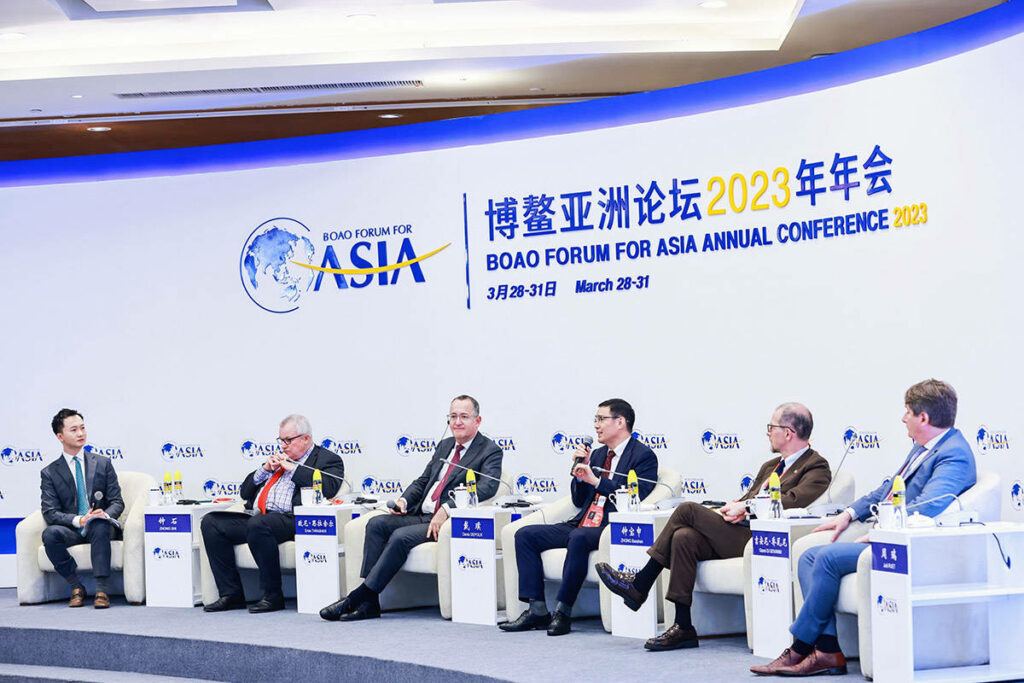
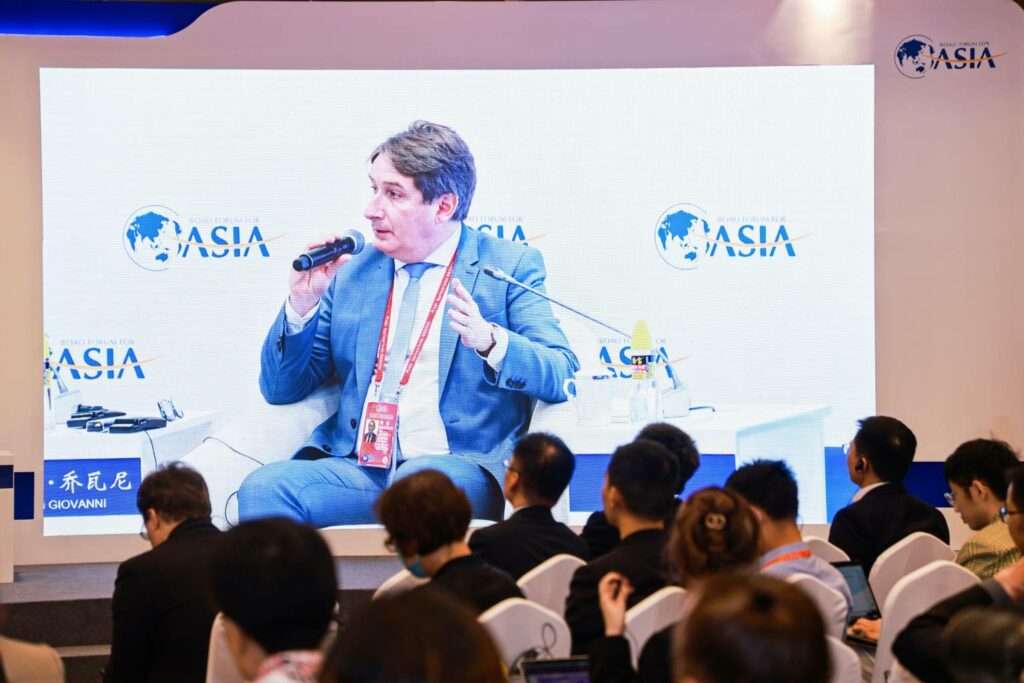
Takeaways from the plenary session
BOAO Forum’s plenary session saw leaders from all around the world taking the stage to discuss current affairs. After stressing that “Russian agression has undermined the world order,” Singapore Prime Minister Lee Hsien Loong insisted that beyond building strong relations with China, Asian countries needed to mesh with one another, highlighting ASEAN’s centrality. Praising the RCEP and trans pacific dynamics, PM Lee called for Asia to always remain an open region building partnerships.
Pedro Sanchez, Prime Minister of Spain, stated that in its upcoming capacity assuming the presidency of the EU, Spain wants to contribute to peace and trust rebuilding. The country wants to focus on having a renewed approach to globalization, one mindful of its environmental footprint and stability, moving beyond sole cost preoccupations. The EU is therefore building a new green and digital industry and will defend its values and interests. China and the EU, though competitors, can also remain partners as far as the sovereignty of countries is respected and a level playing field on competition is upheld. According to PM Sanchez, China and the EU must remain partners economically but also and most importantly work together on reaching the objectives set in the Paris agreement, the SDGs, and providing finance for development and debt risks for developing countries.
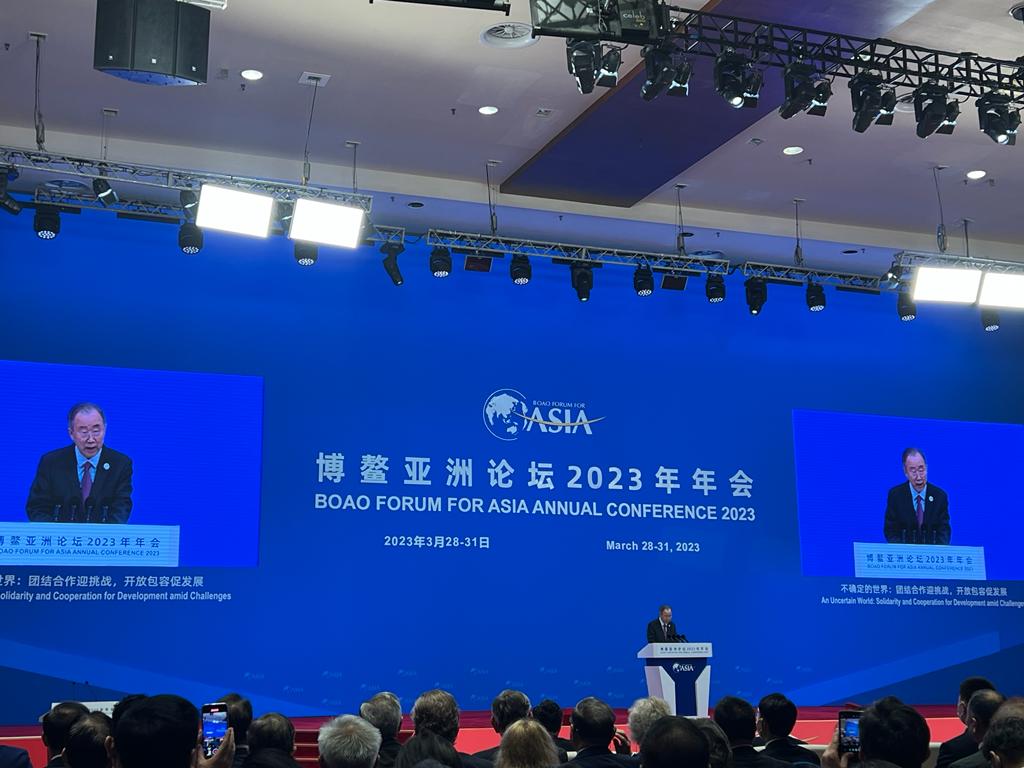
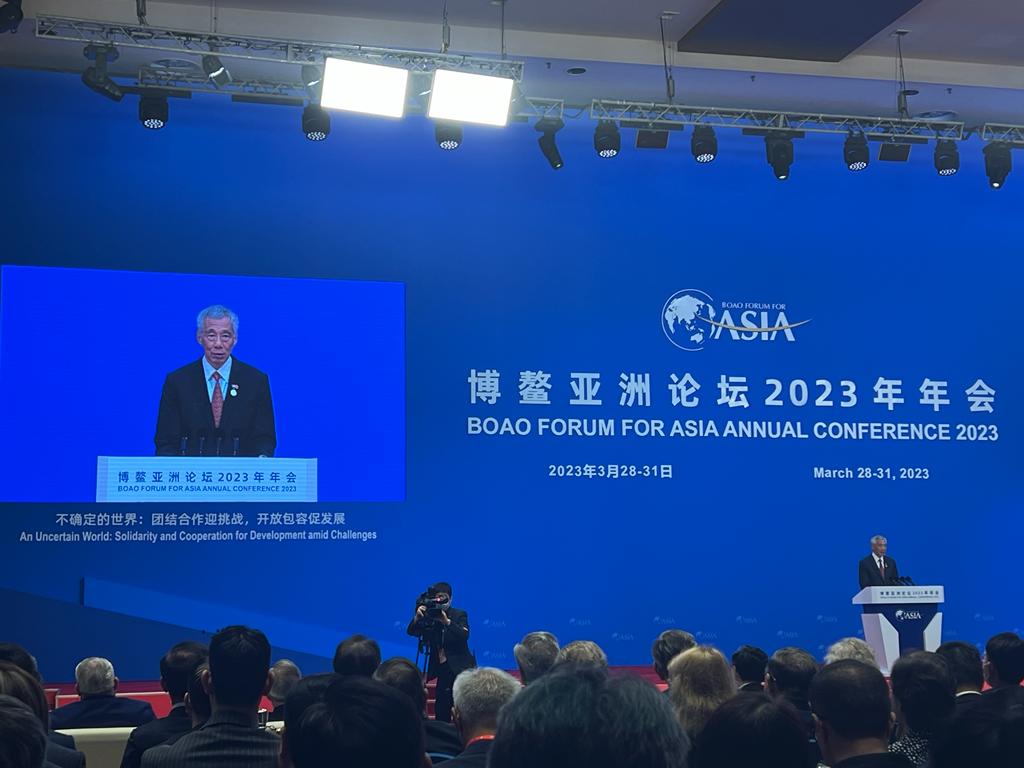
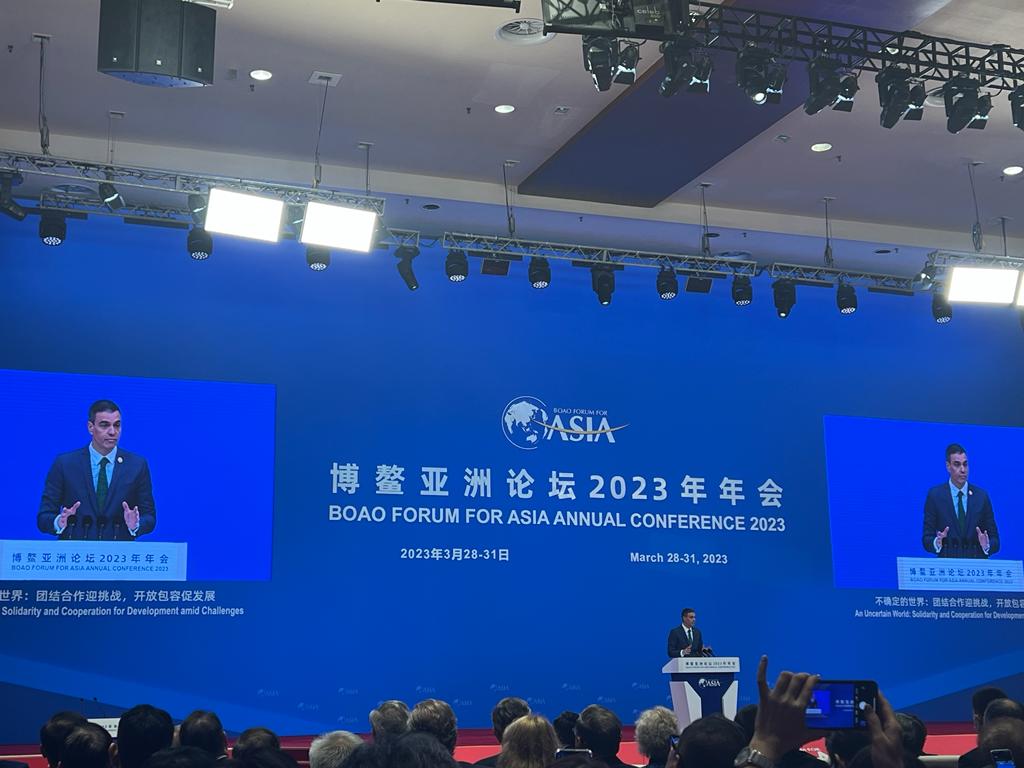
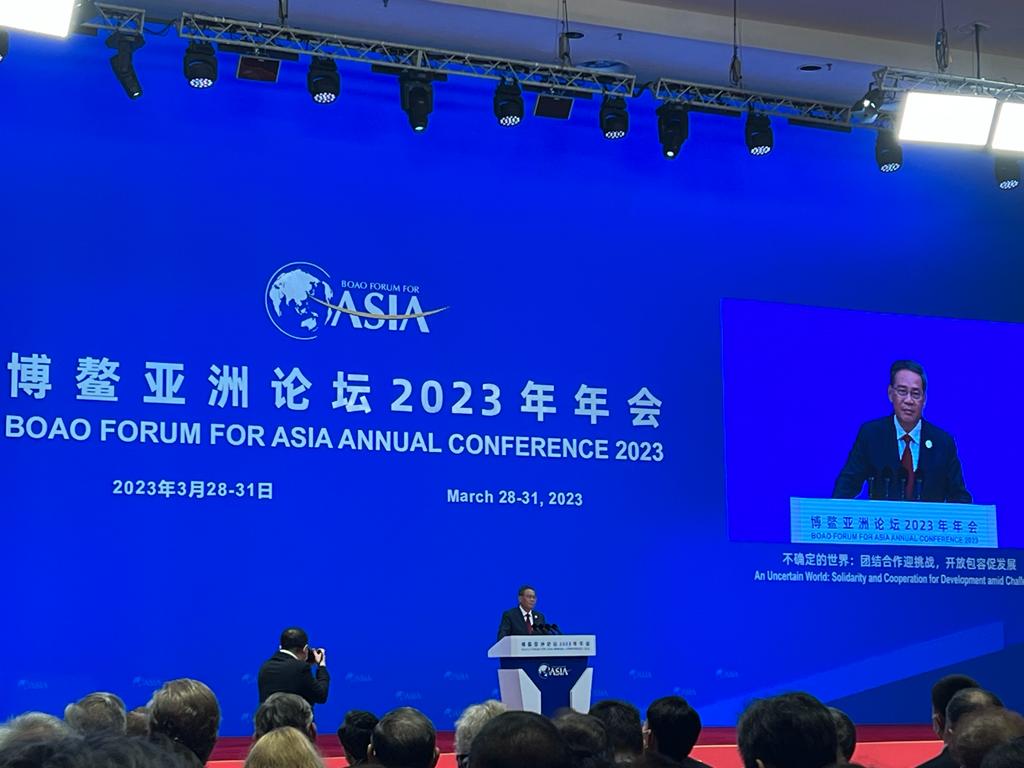
Joel Ruet also attended Chinese Premier Li Qiang’s address to BOAO forum delegates. In his speech, Premier Li stated that “without peace, Asia won’t have a bright future,” before adding that “the many issues facing humanity must be addressed through consensus.” To do so, Li Qiang emphasized the role of BRICS countries in enforcing a multilateral rule of law, qualifying as “more just and equitable” than the existing UN system.
Li Qiang stated that “in an uncertain world, China’s way to prosperity is an anchor of certainty,” stressing the importance of China’s growth for developing countries in general and for Asia and the global economy. China’s path forward will “continue the effort of deepening the demand while structuring the supply side in a way that is favourable to foreign investment.”
It is however to be recalled that investments reached a low in 2022 due to China’s zero covid policy, which will have an impact on economic results in the coming two years and weakened foreign confidence in the Chinese market. This short term cycle will have to be absorbed, with medium term prospect looking more encouraging and serving as a transition while the demographic window of opportunity is closing.
Watch Joel Ruet’s analysis of Chinese Premier Li Qiang’s speech for CGTN:
UN 2023 Water Conference: The Bridge Tank and Initiatives for the Future of Great Rivers organise a side event on the preservation of the Fouta Djallon Highlands
Preserving the Fouta Djallon Highlands in Guinea, a region commonly referred to as the water tower of West Africa, harbouring the sources of the region’s largest rivers, brought together The Bridge Tank, Initiatives for the Future of Great Rivers (Initiatives pour l’Avenir des Grands Fleuves, IAGF), and the Senegal River Basin Development Organisation (Organisation pour la mise en valeur du fleuve Sénégal, OMVS), who together organized an official side event of the UN 2023 Water Conference on Friday 24 March, under the patronage of France and Guinea.
These forested highlands are more than ever at risk – endangered by the combined actions of populations left stranded by misdevelopment, livestock that needs more resilient practices, and the effects of climate change calling for agrarian and forestry adaptation within reach. This conference and the presence of high ranking government officials from France and Guinea, including Bérangère Couillard, State Secretary for Ecology, French Republic, and the chief of cabinet of Aly Seydouba Soumah, Ministre of Energy, Hydropower and Hydrocarbons, Republic of Guinea, as well as senior representatives from West African River Basin Organisations, like Soufiana Dabo, Guinea coordinator, OMVS and Bireme Hamid Abderahim, Executive Secretary, Niger Basin Authority, and development actors active on the ground offered a unique opportunity to raise the alarm and call for concerted action.
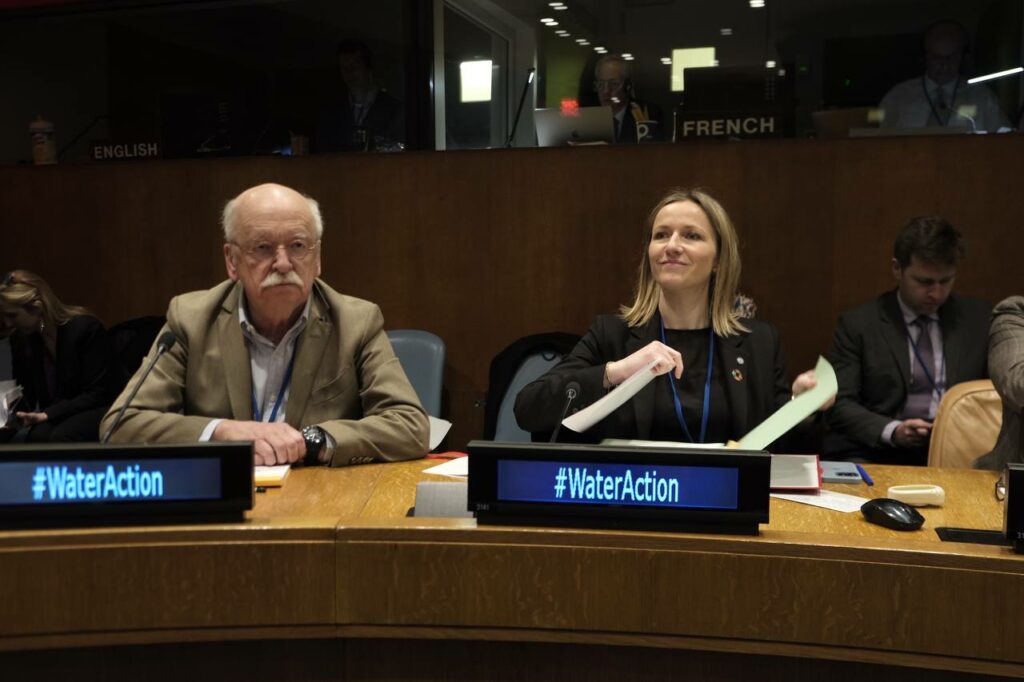
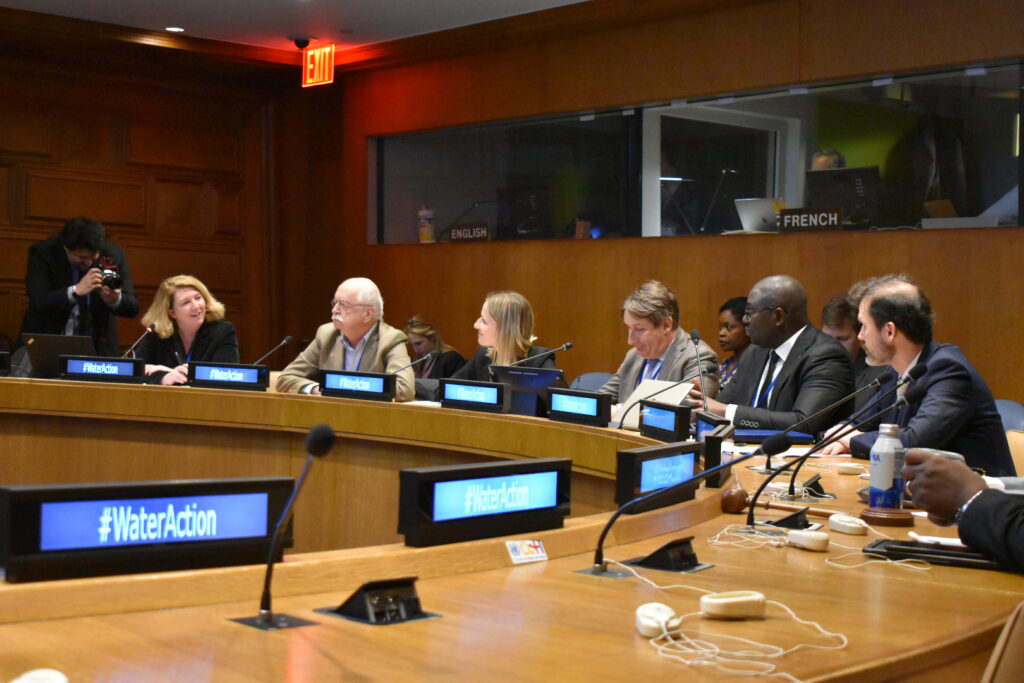
Opening the session as keynote speaker, Bérangère Couillard, State Secretary for Ecology, France, stressed the importance of protecting the Fouta Djallon and the sources of West Africa’s largest rivers, and reminded the audience of France’s central role in developing integrated water resources management.
Erik Orsenna, President, Initiatives for the Future of Great Rivers, made a passionate plea for action to preserve these forested ecosystems which provide water to a region home to 300 million people. He particularly emphasized the importance of river basin organisations in preserving peace and generating transboundary cooperation as the region battles with increasing hydric-stress.
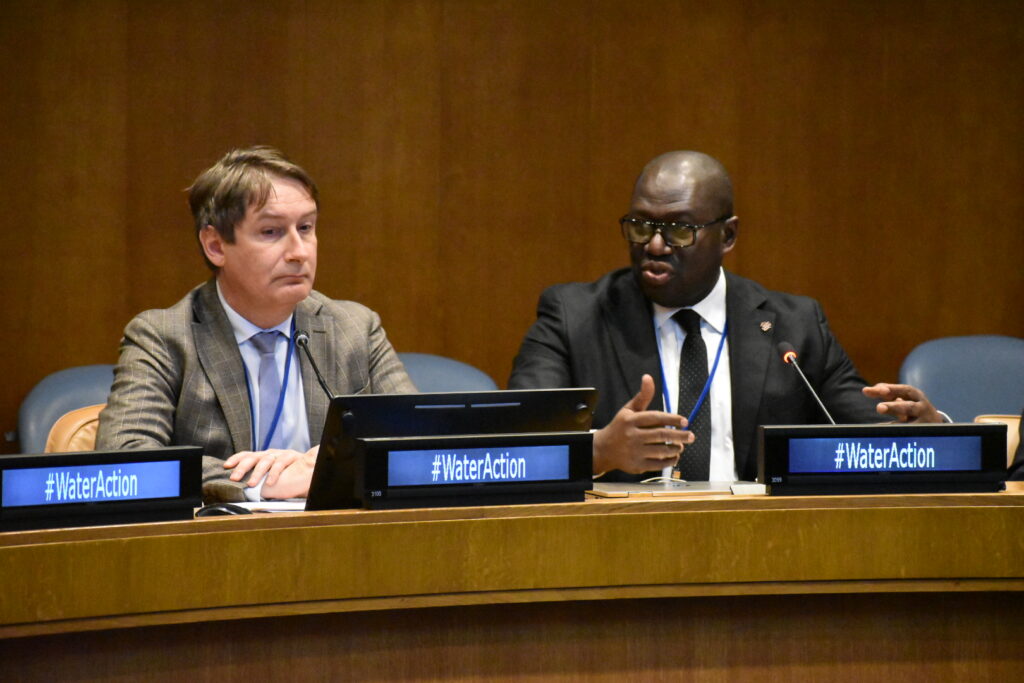
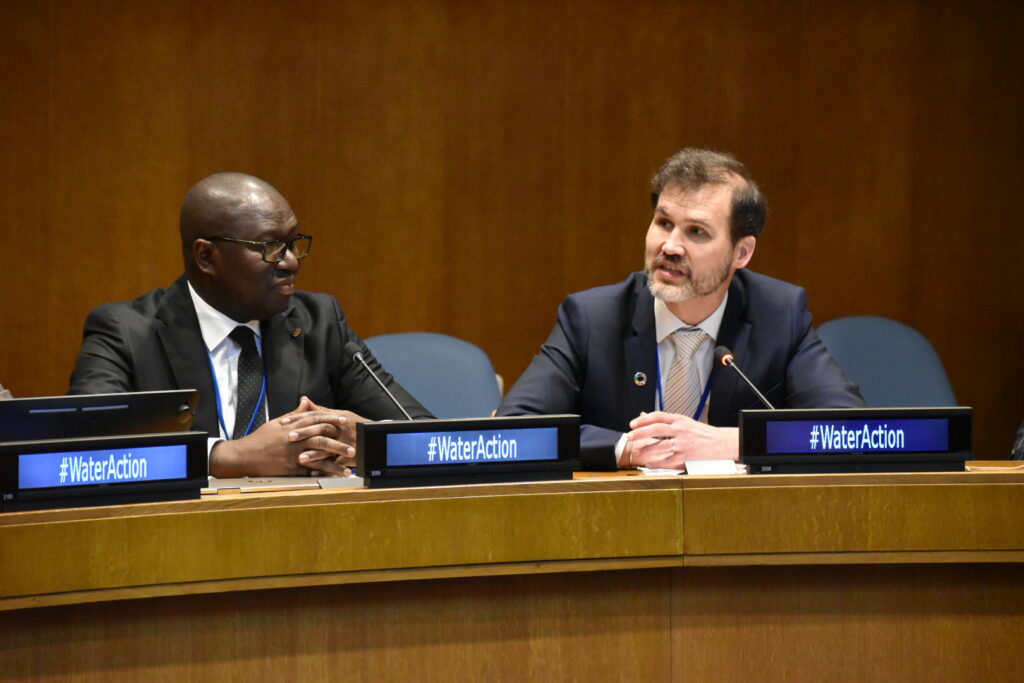
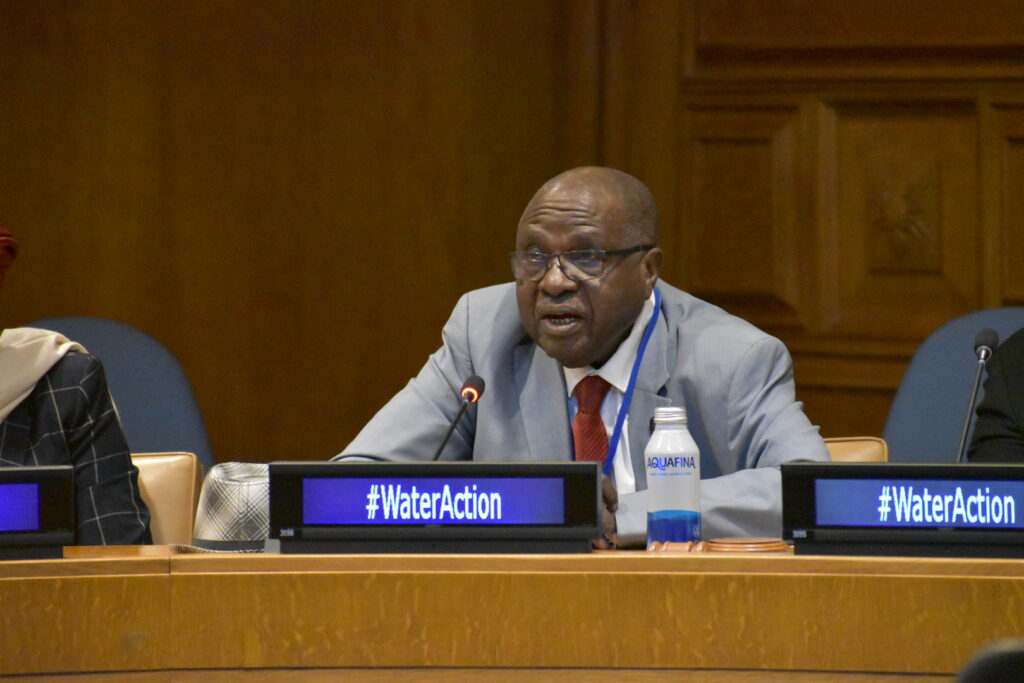
Representing such an RBO which has contributed to development and cooperation in West Africa, Soufiana DABO, Guinea coordinator, OMVS, introduced the specific context of the Fouta Djallon and the risks weighing upon its sources, from deforestation to siltation of watercourses and obsolete agricultural practices.
Lionel Goujon, Head of Water & Sanitation at the French Development Agency presented the existing initiatives and actions already carried out on the ground, particularly in partnership with the region’s River Basin Organisations.
Joel Ruet, President, The Bridge Tank, introduced a roadmap of solutions to safeguard the Fouta Djallon, including the need to involve young local technological entrepreneurs, training local populations, and mobilising green finance to scale up actions of the ground. The importance of mobilising local populations with their knowledge and nature-based solutions was also highlighted by the Executive Secretary of Niger Basin Authority, Mr Abderahim Birémé Hamid.
This side event organised inside the United Nations Headquarters was placed under the patronage of Guinea and France, and was supported by the French Development Agendcy (Agence Française de Développement, AFD), the French Water Partnership, the International Network of Basin Organizations (INBO), the Geneva Water Hub and the Chair Technology for Change of École Polytechnique.

